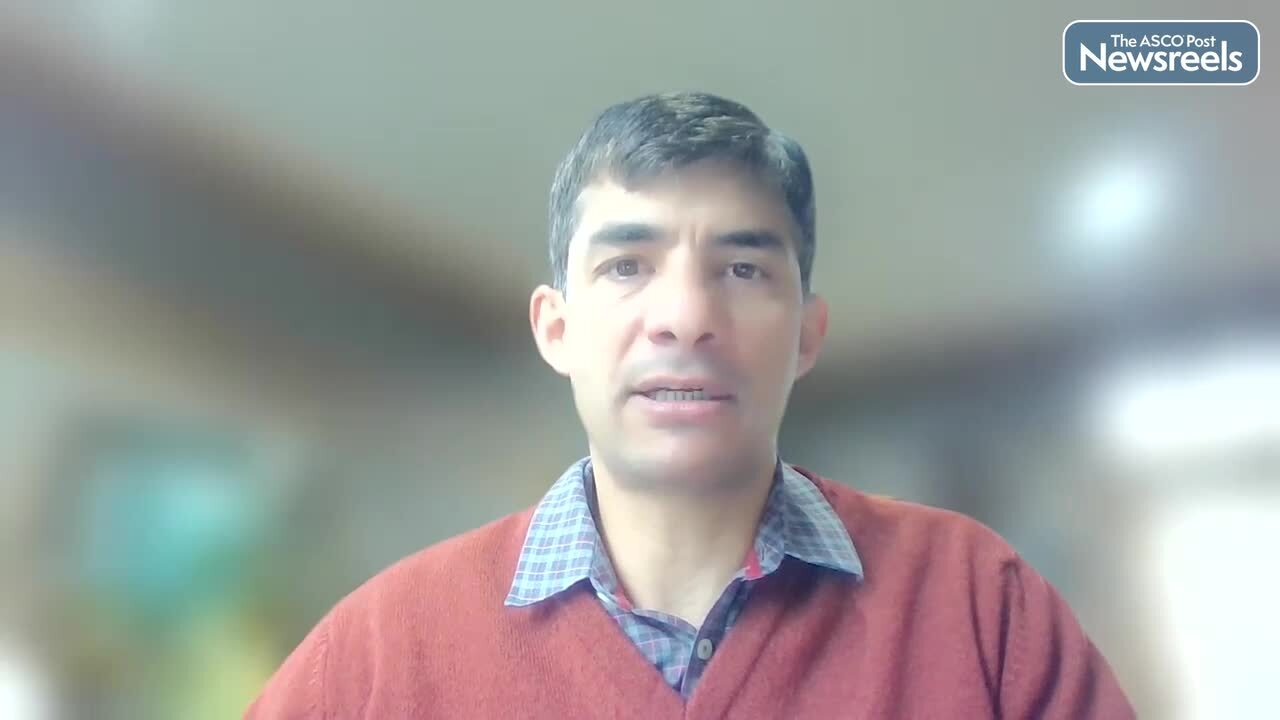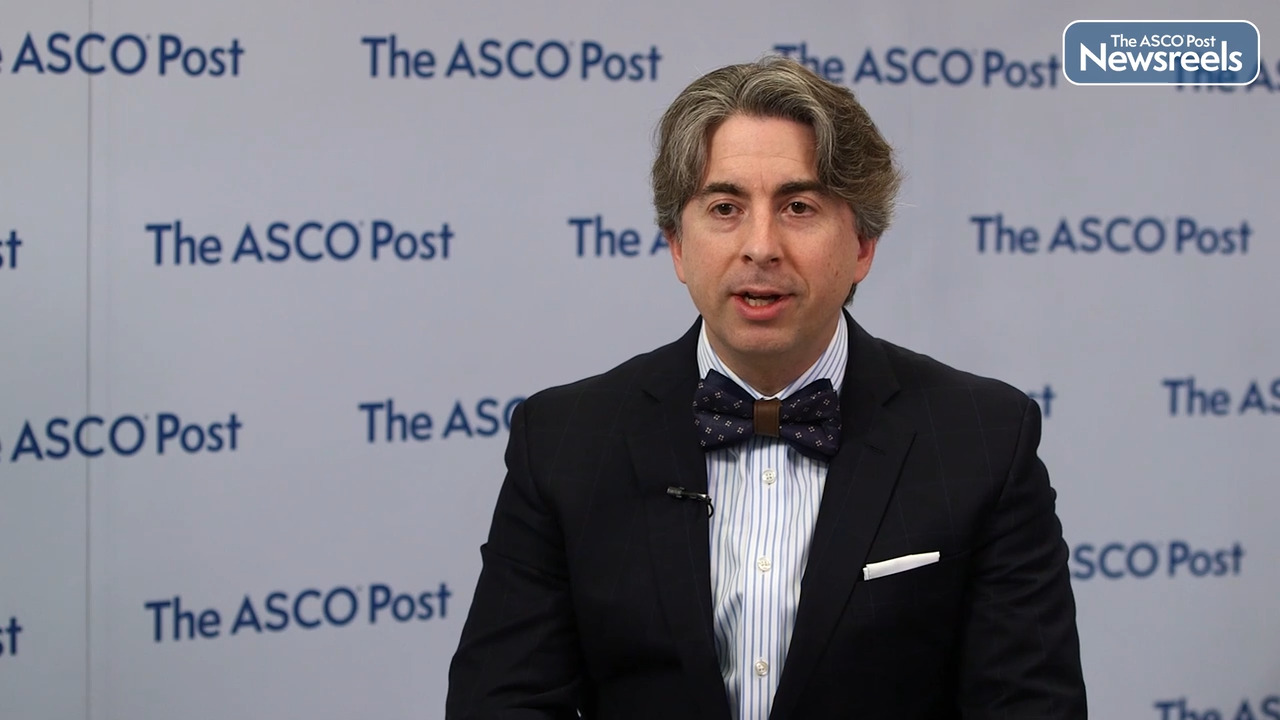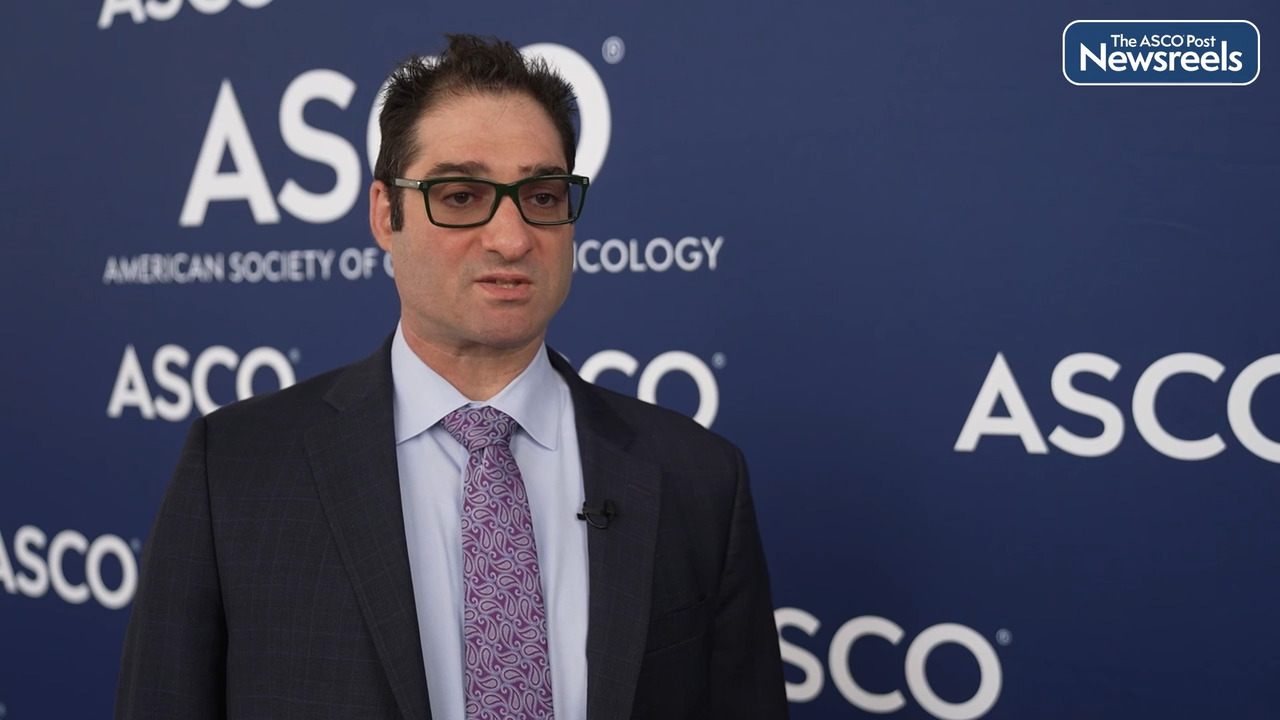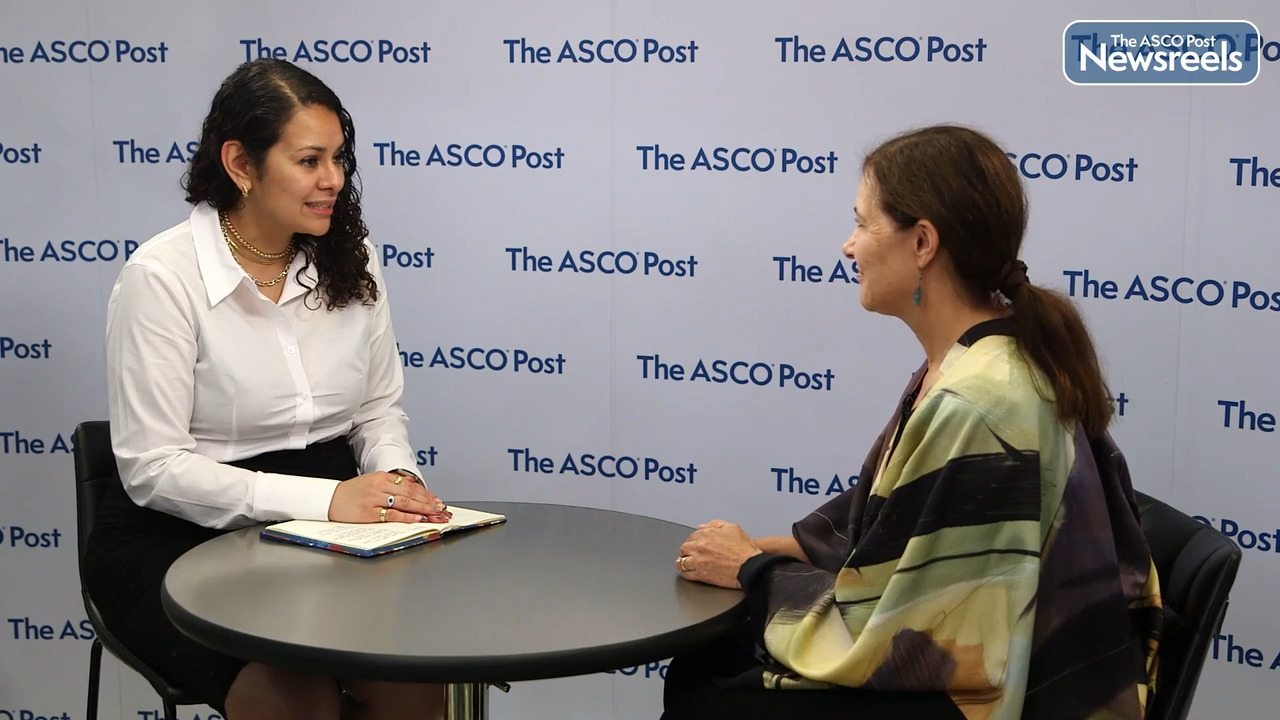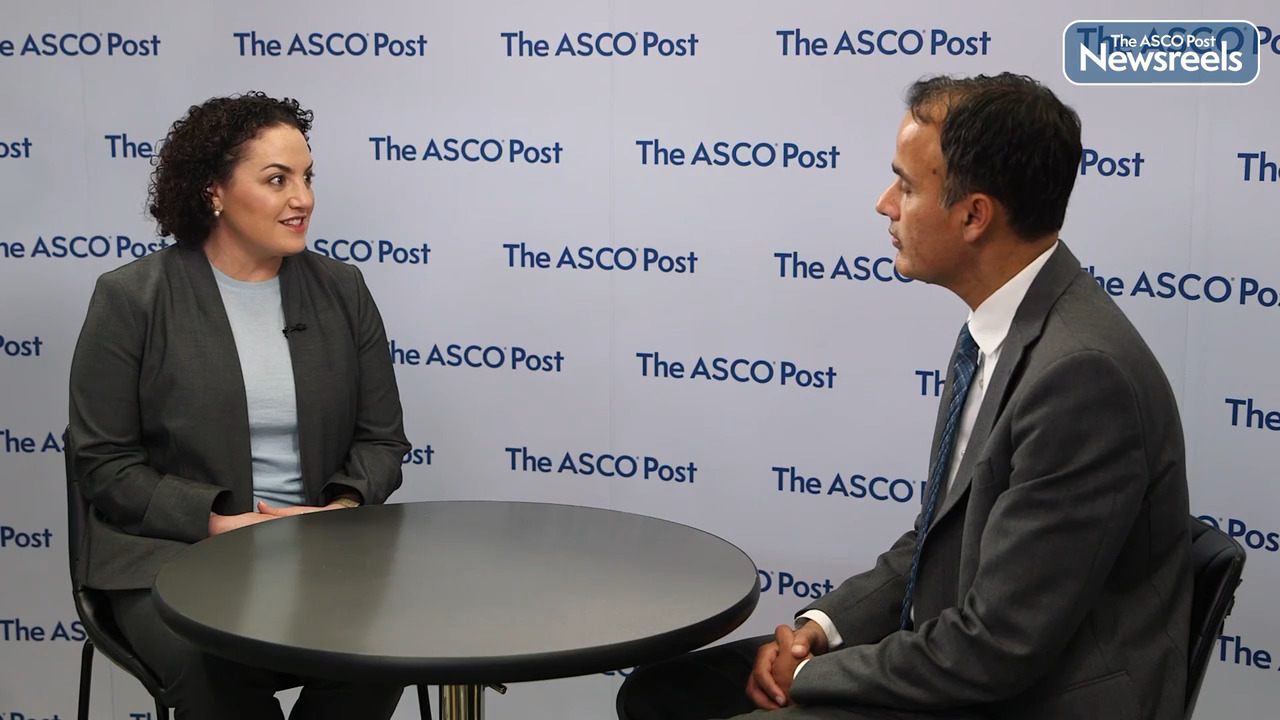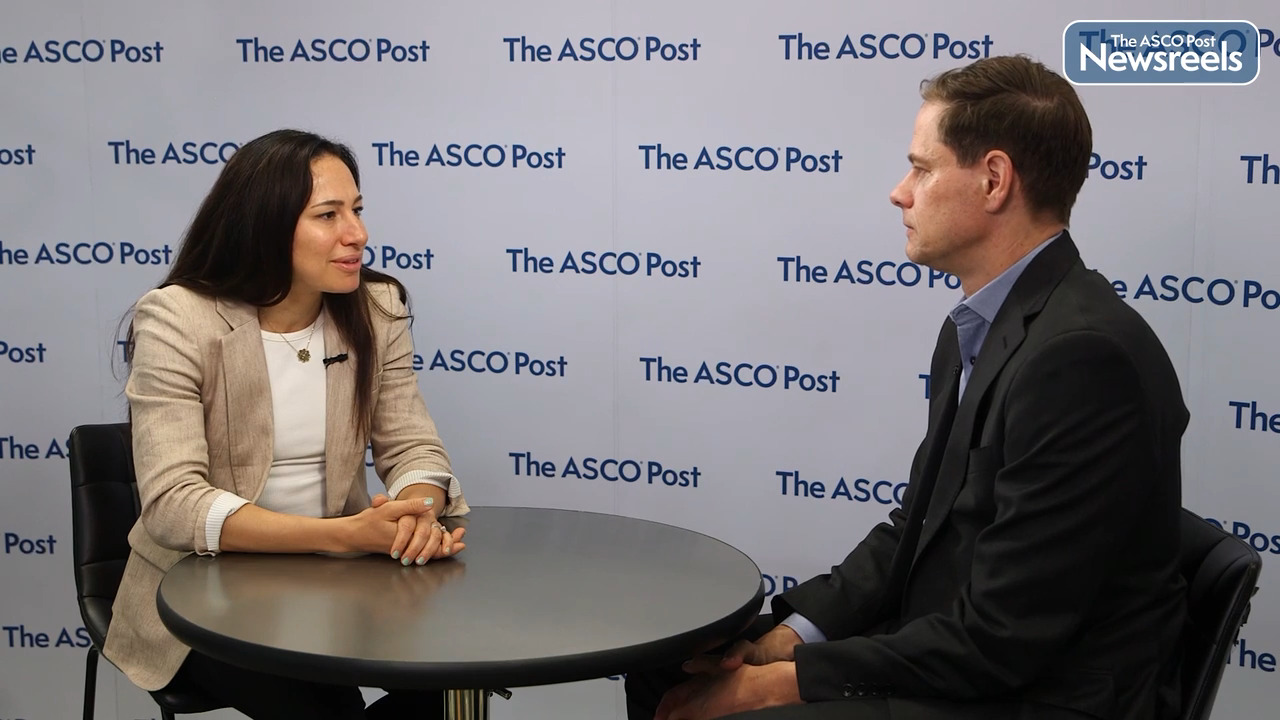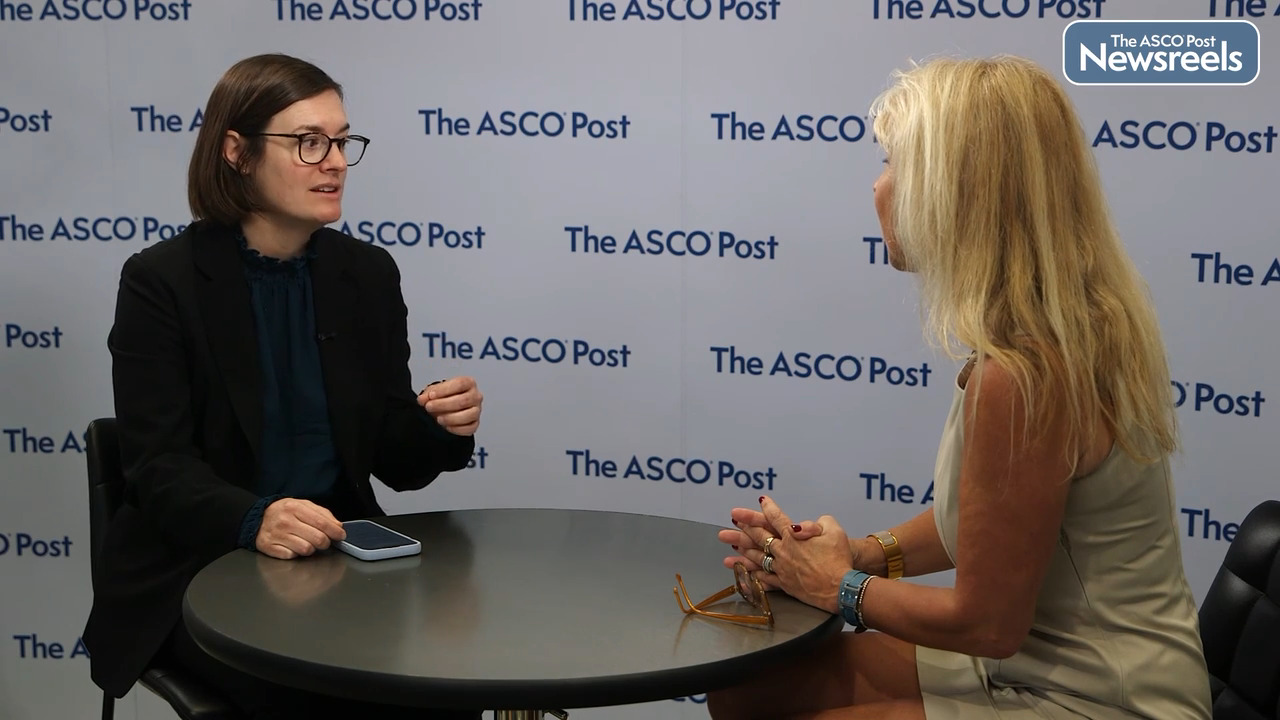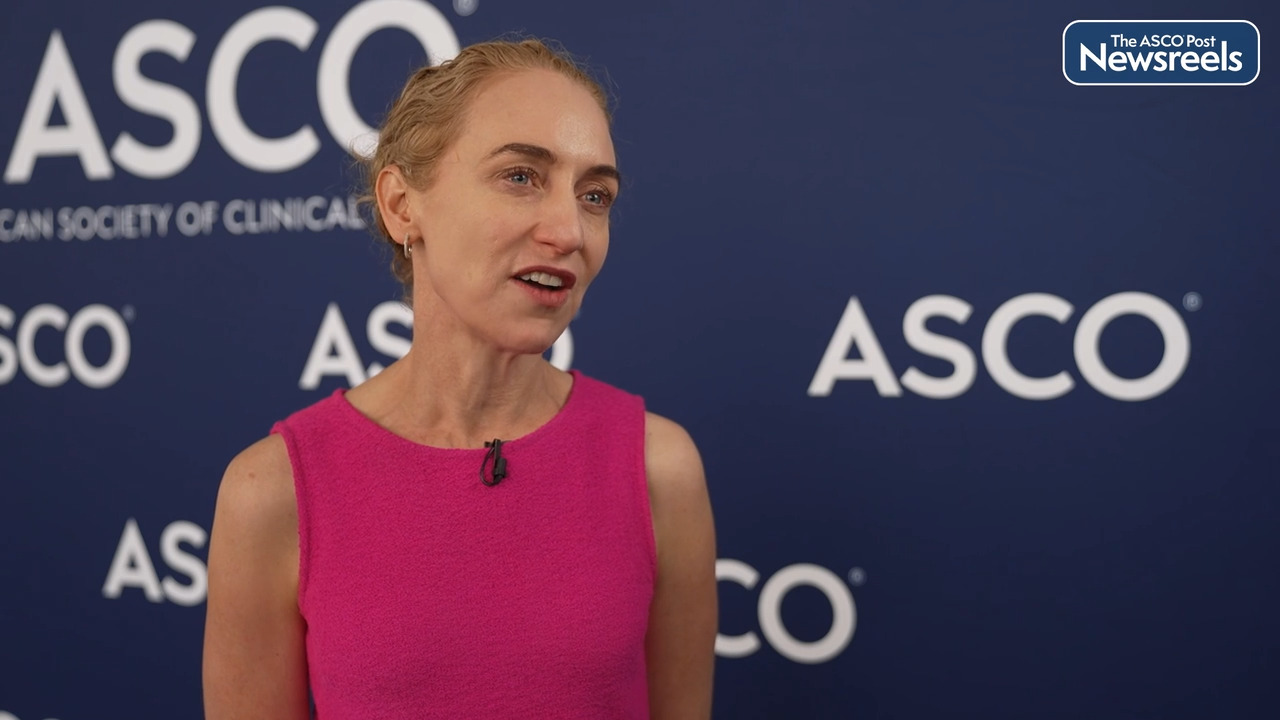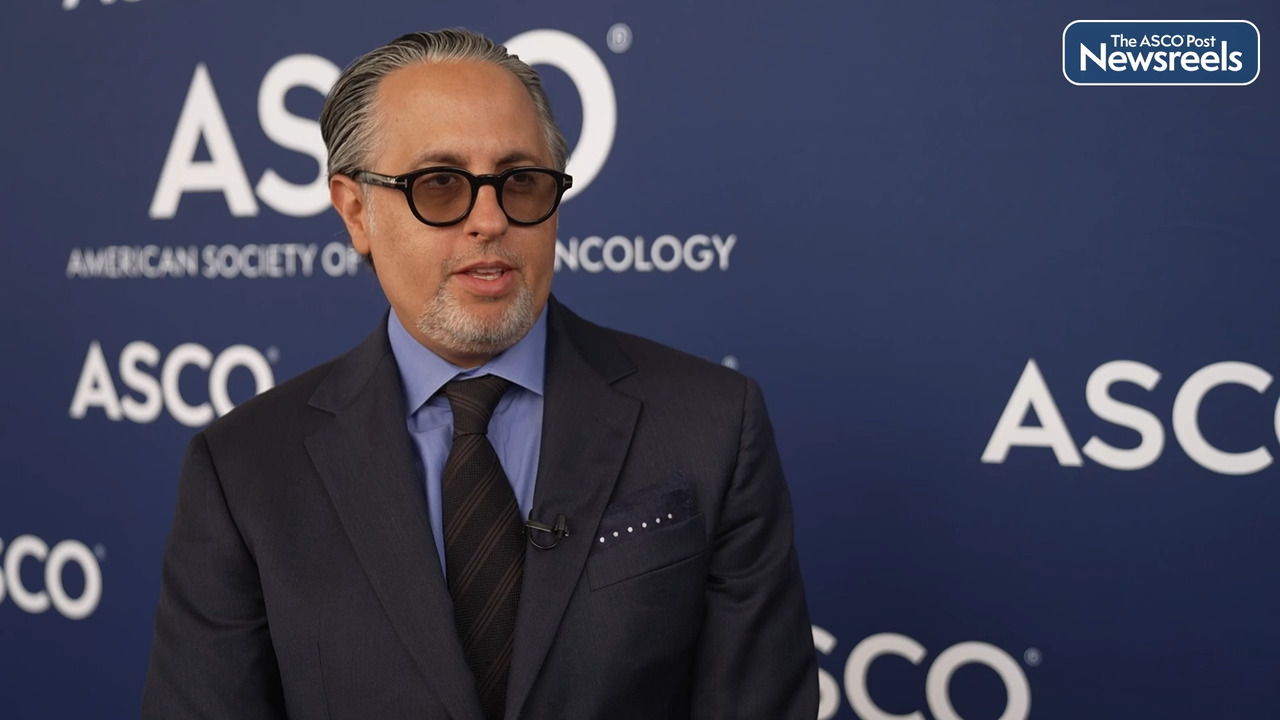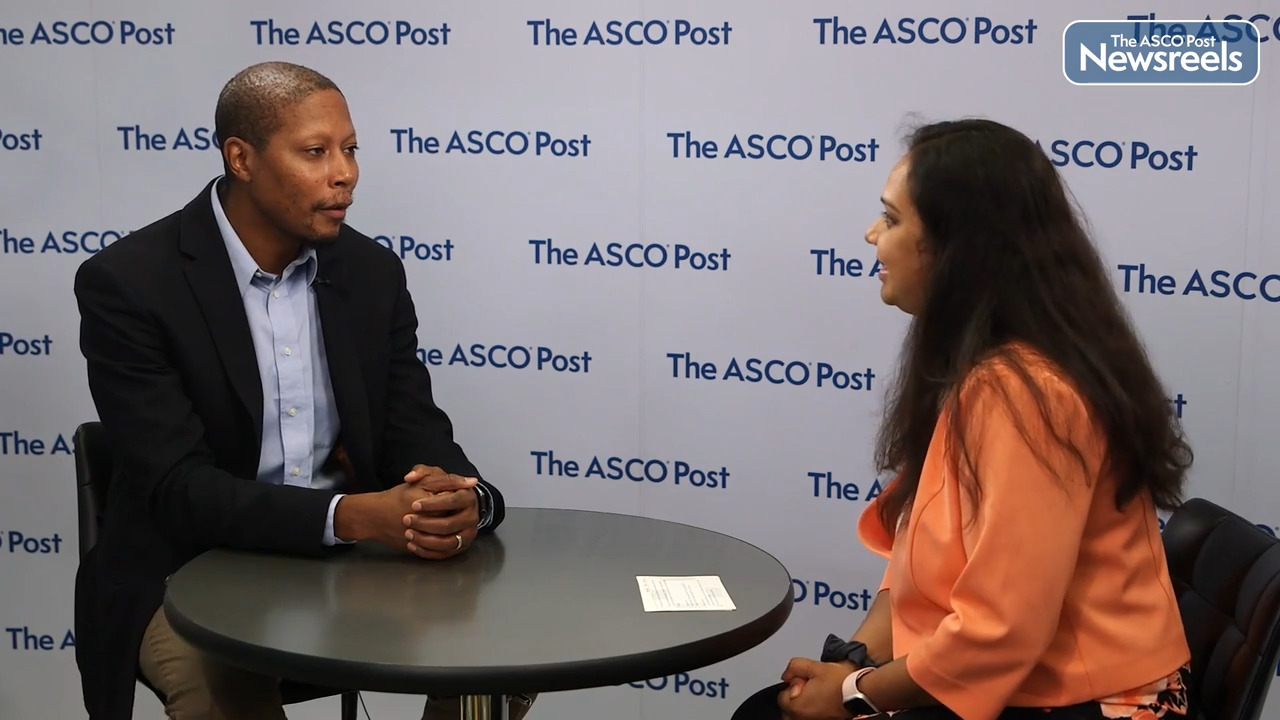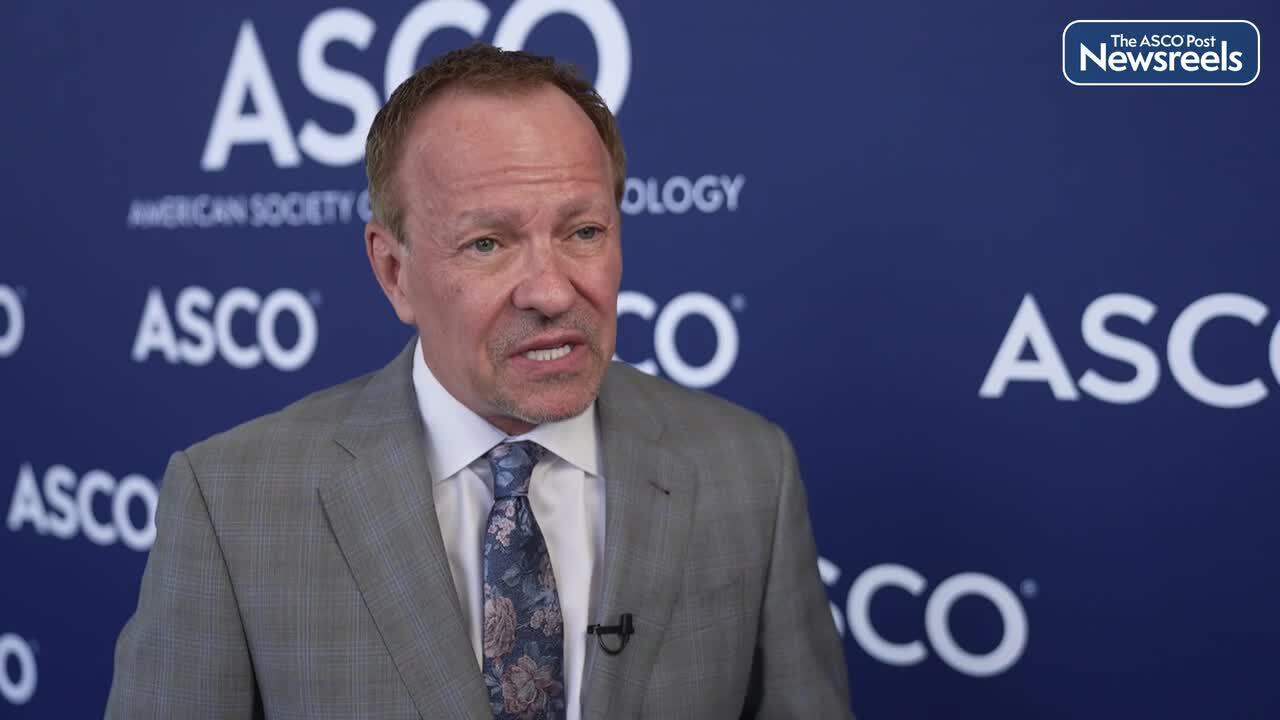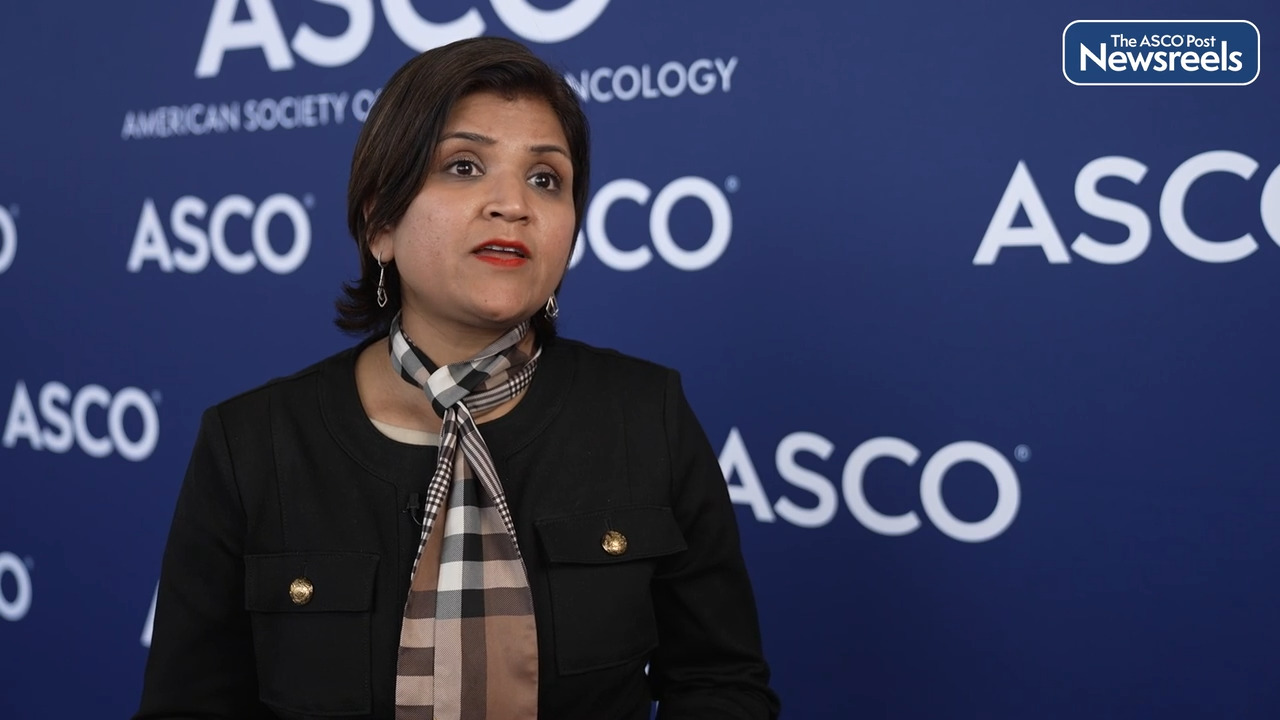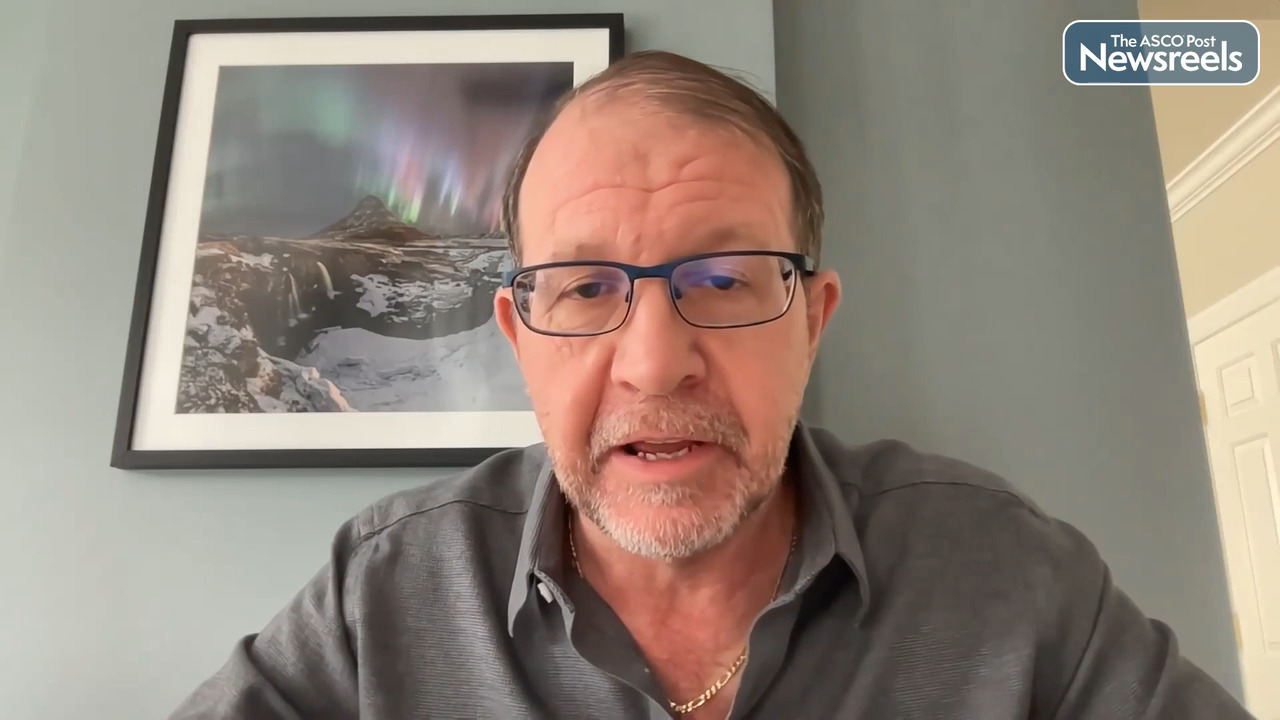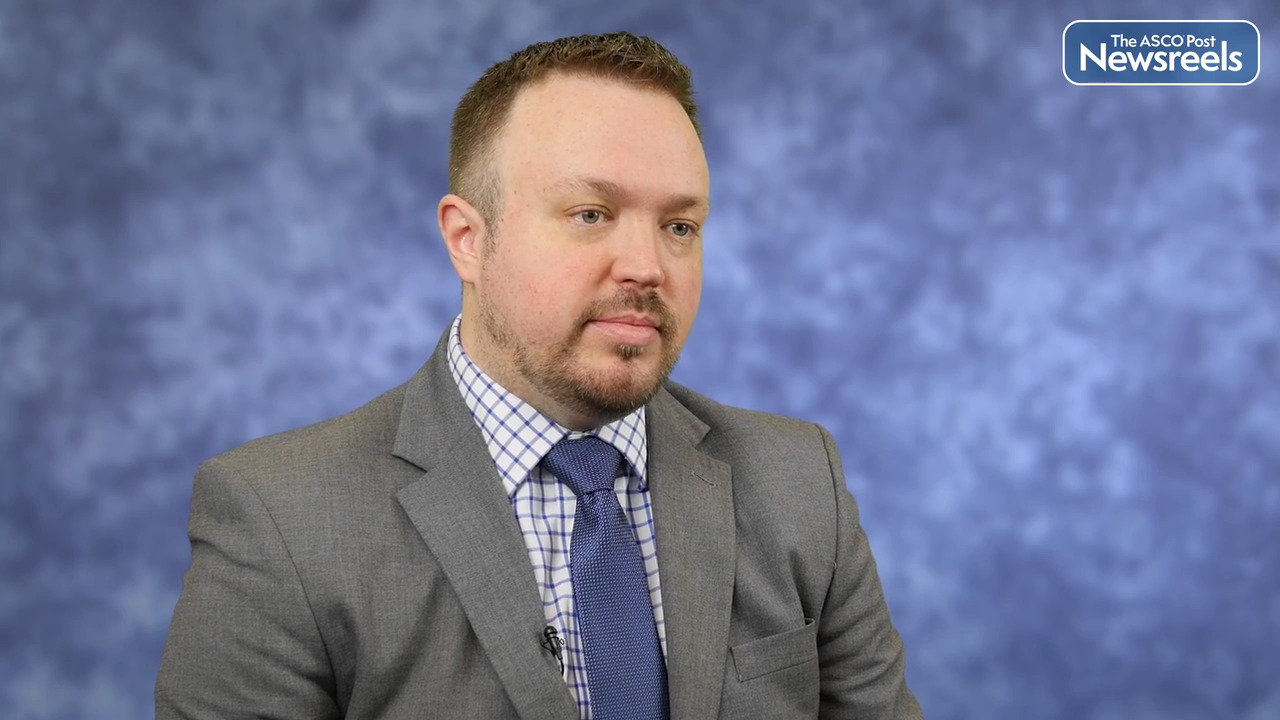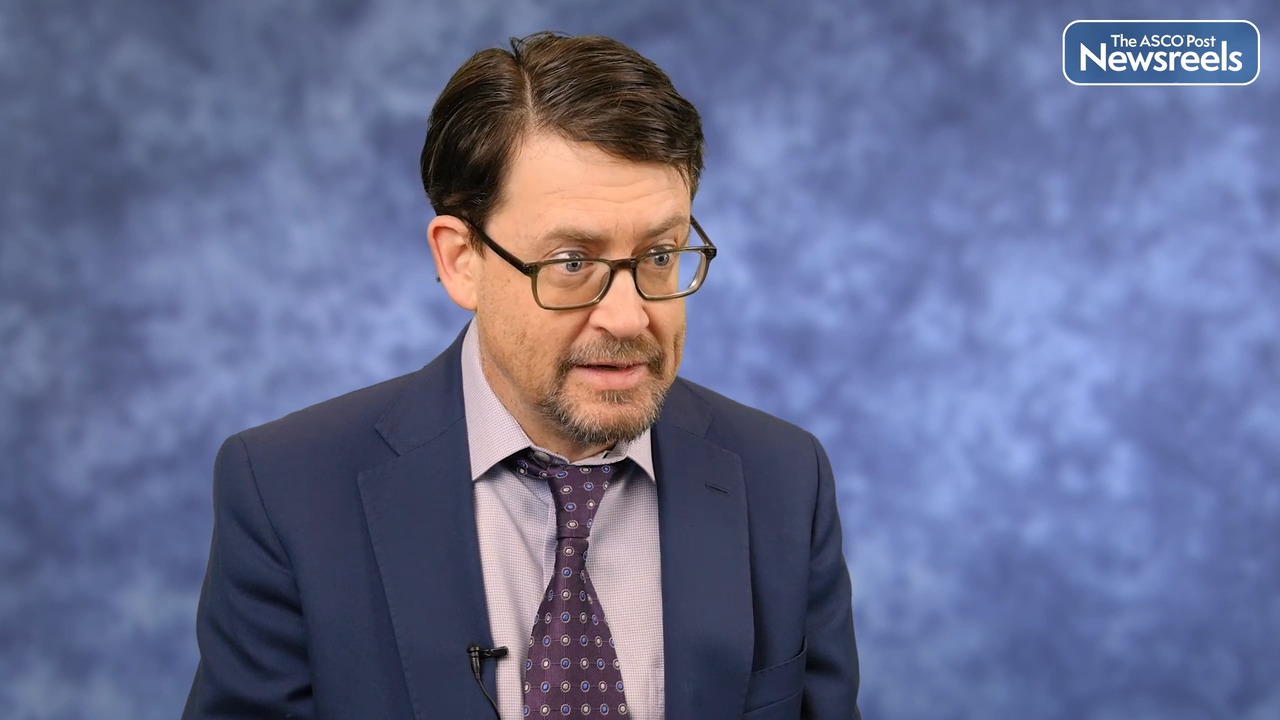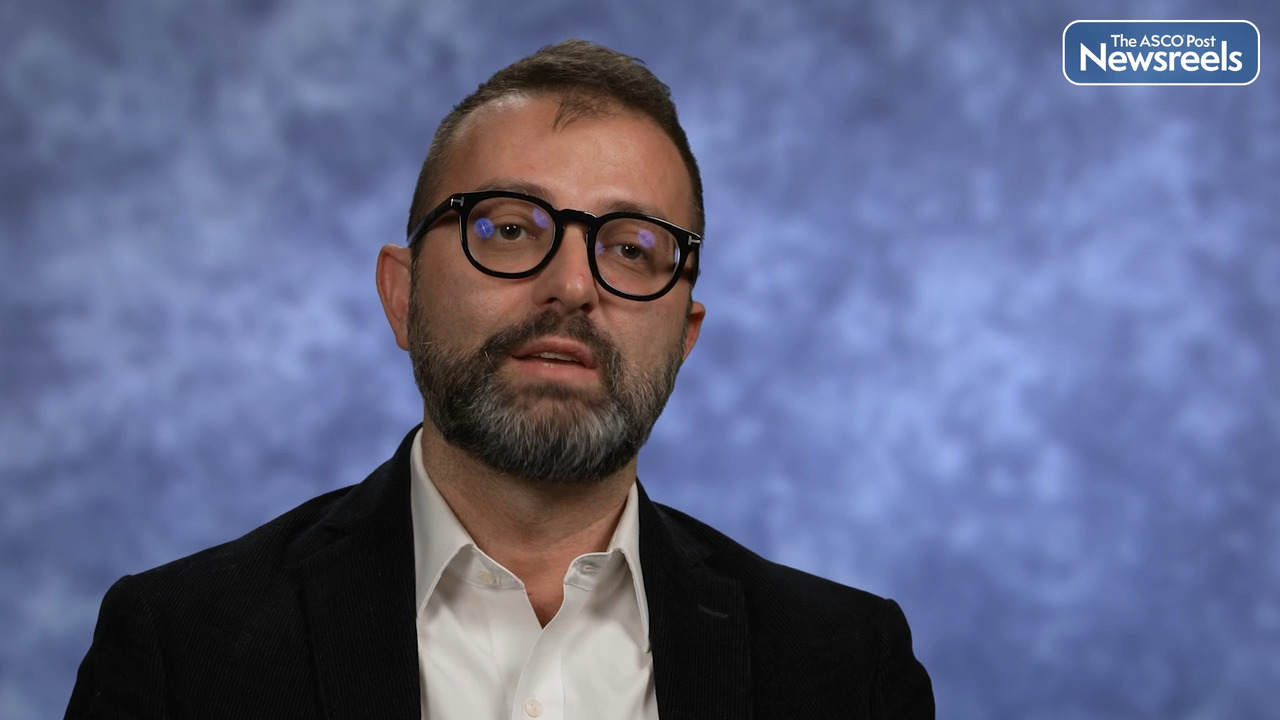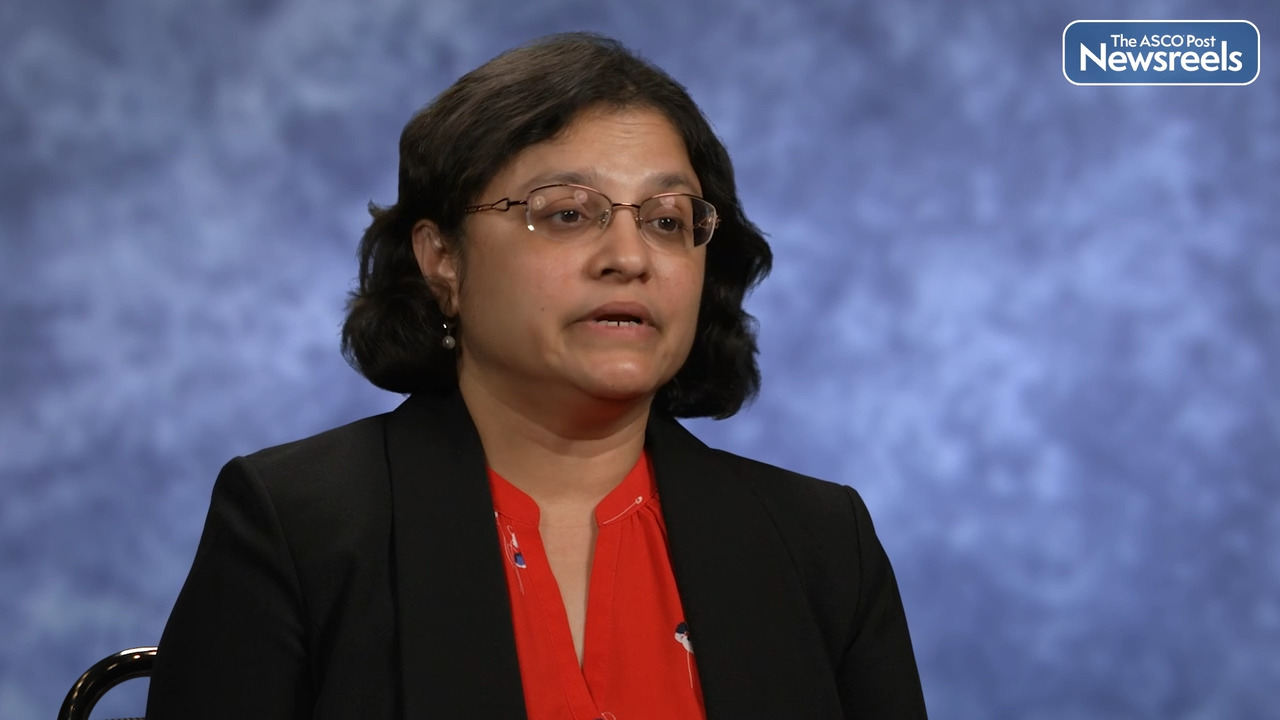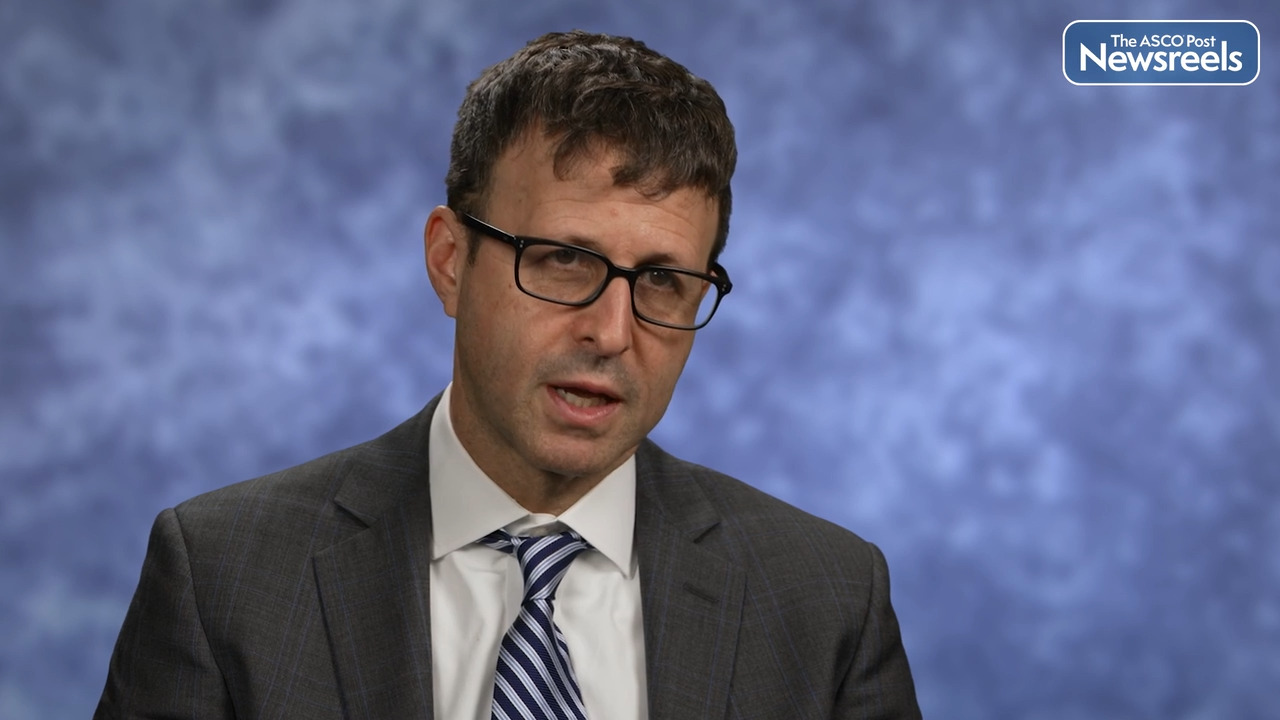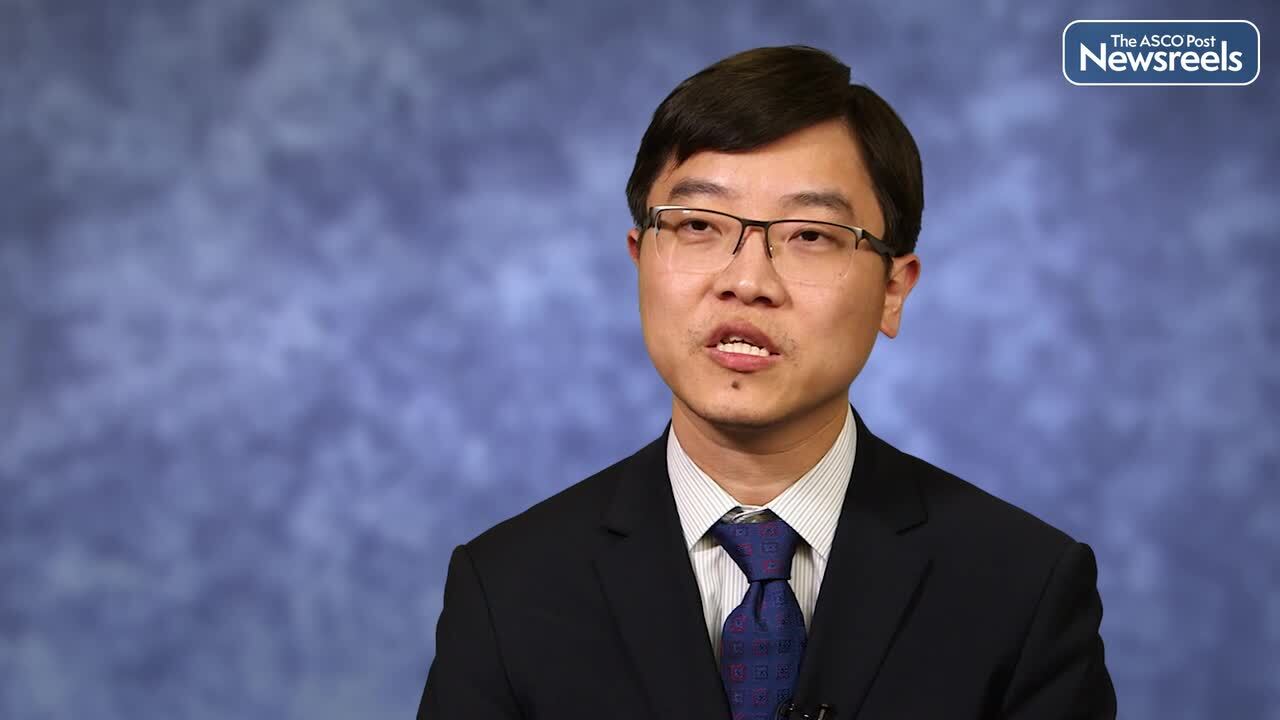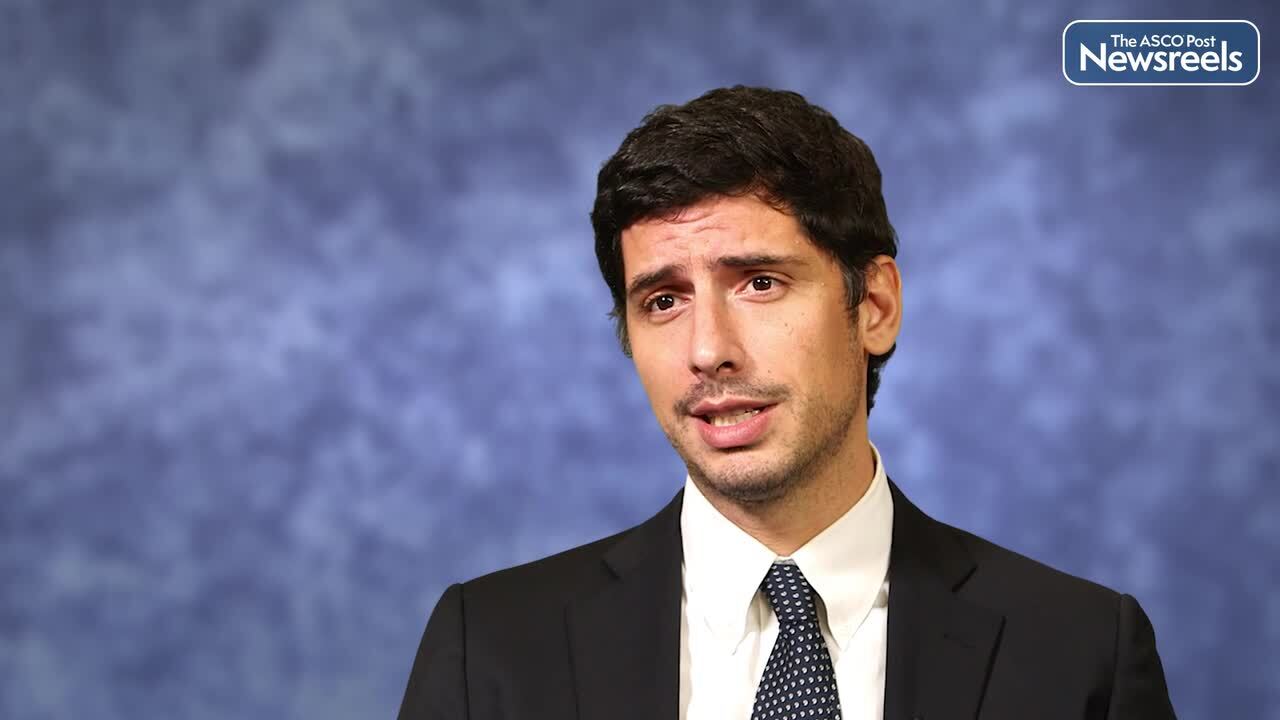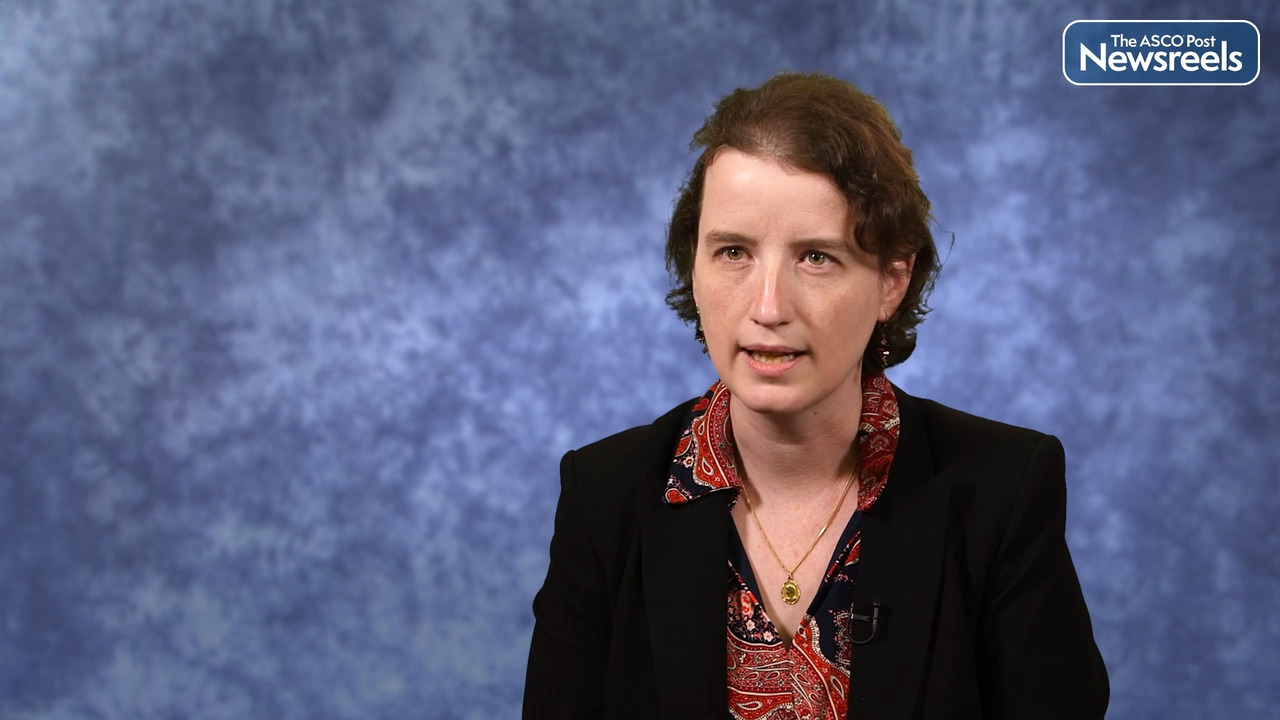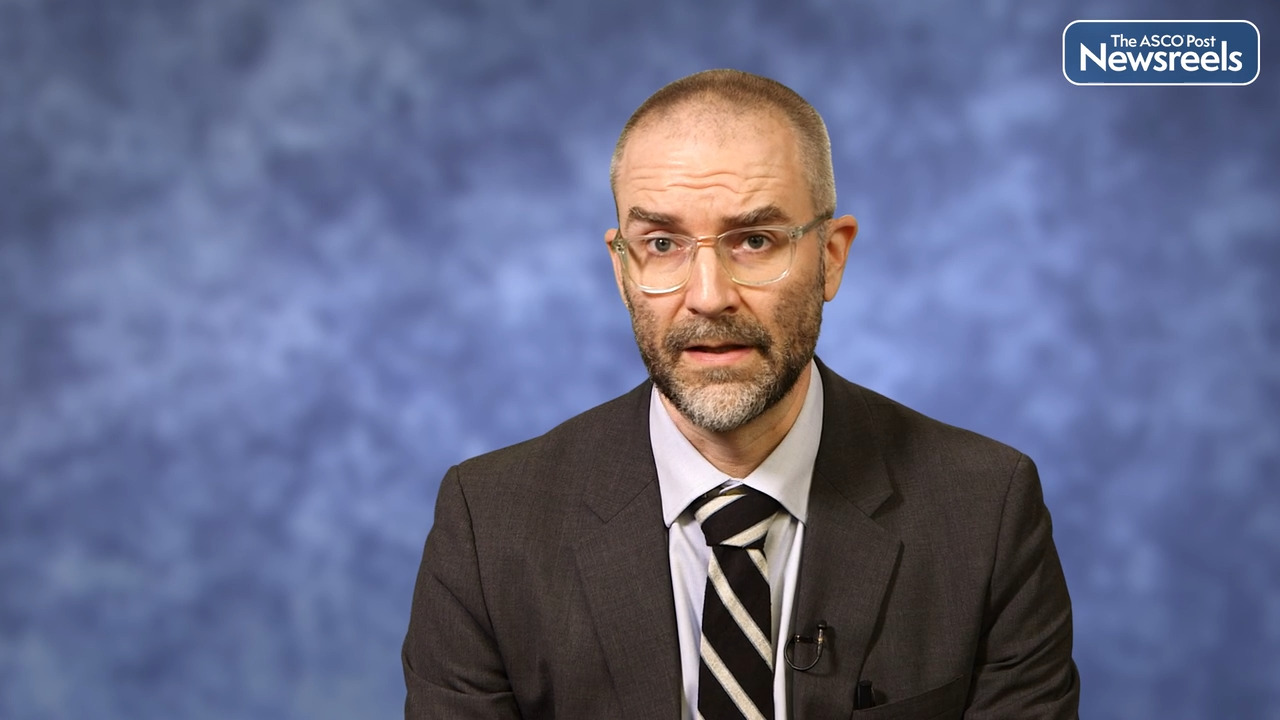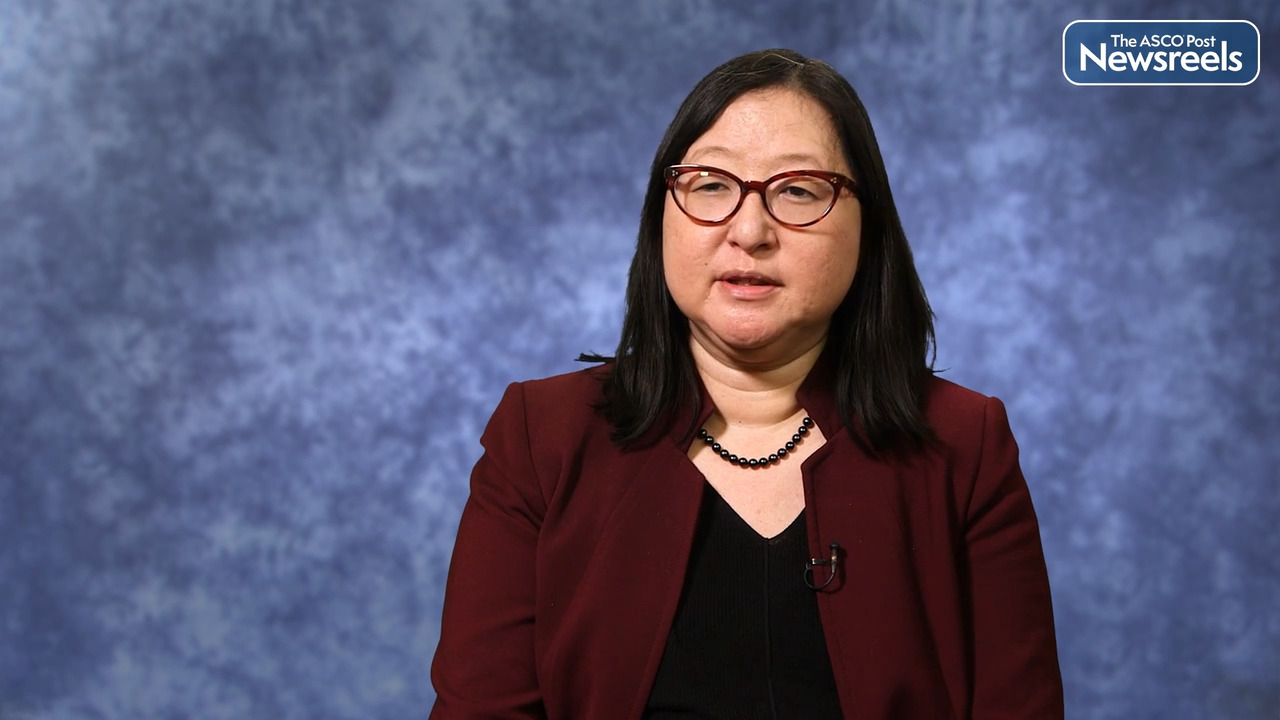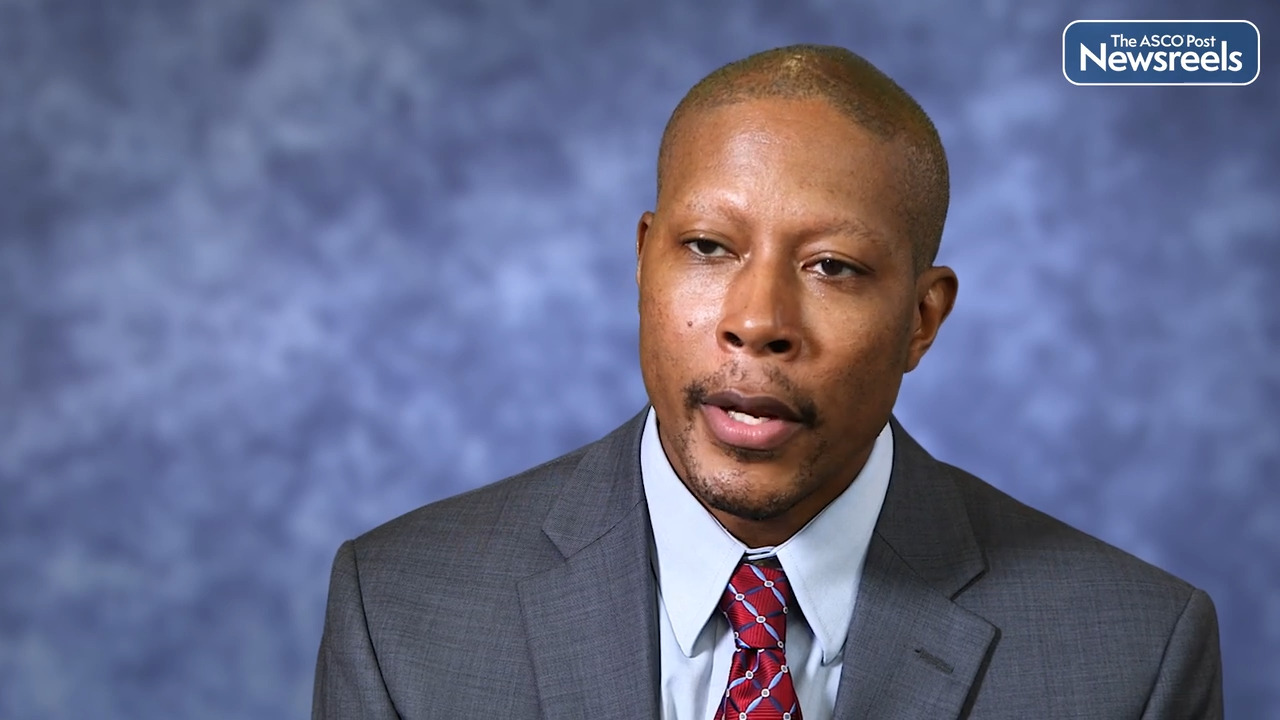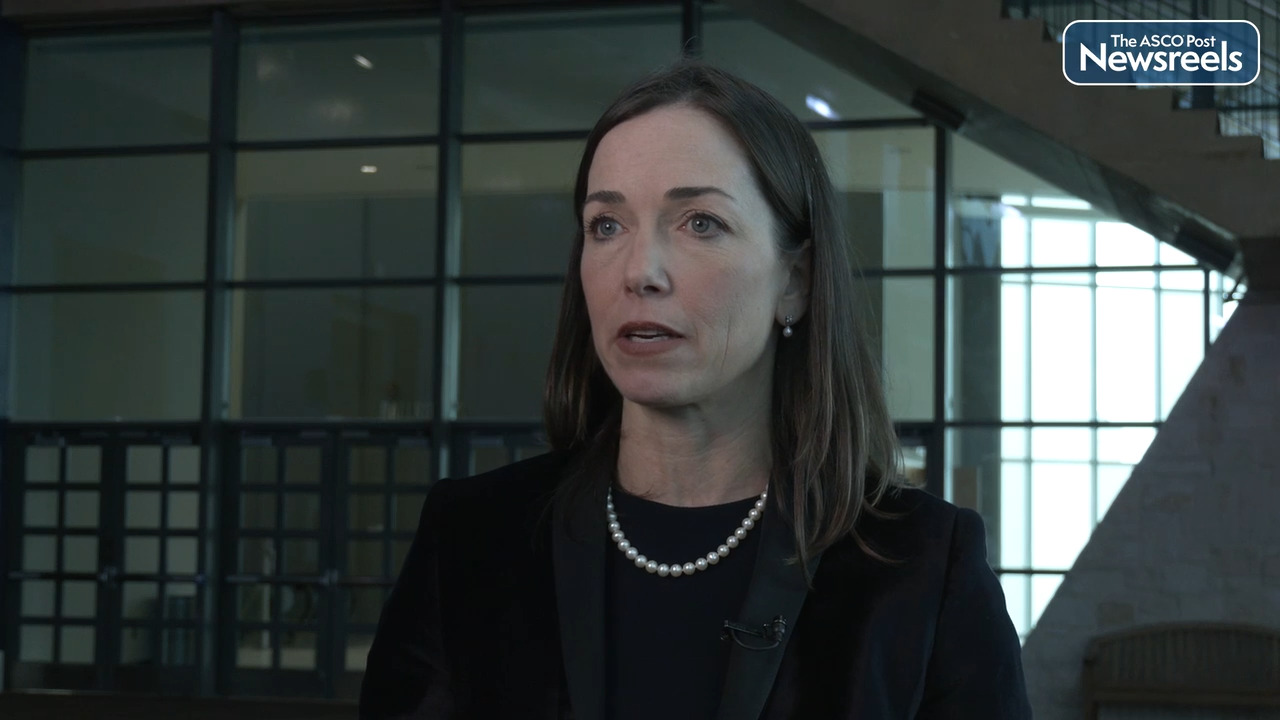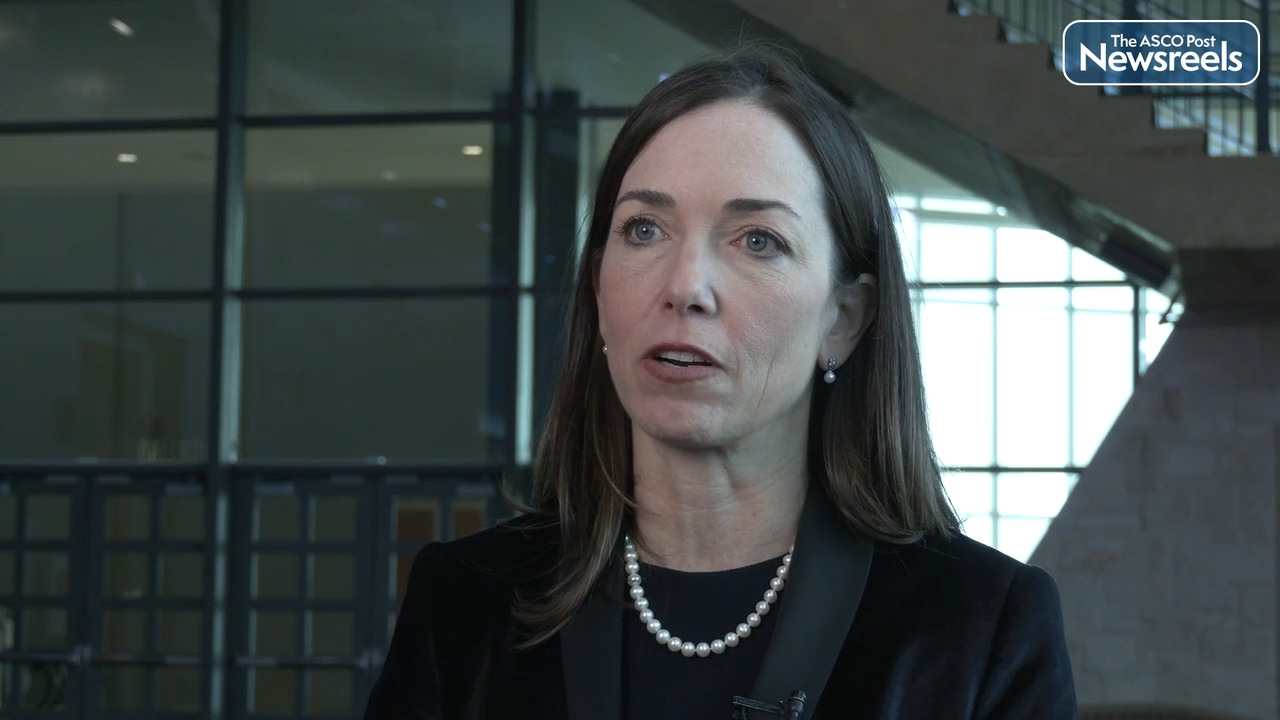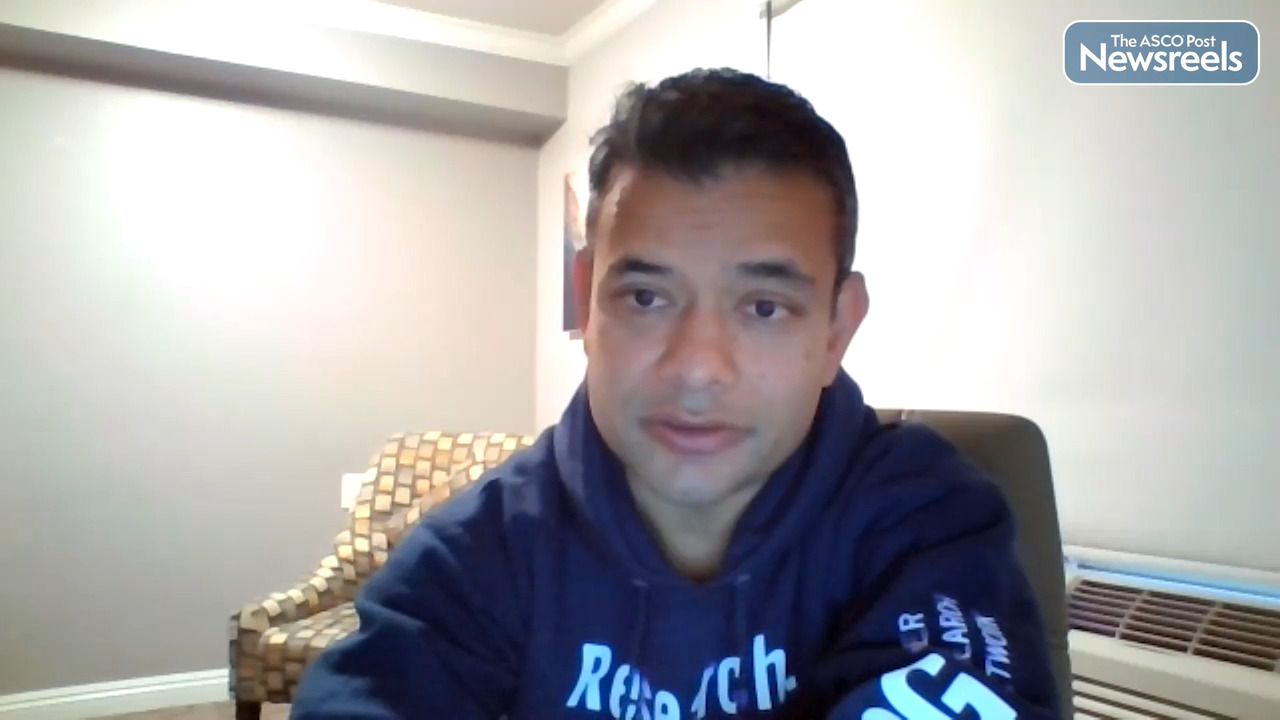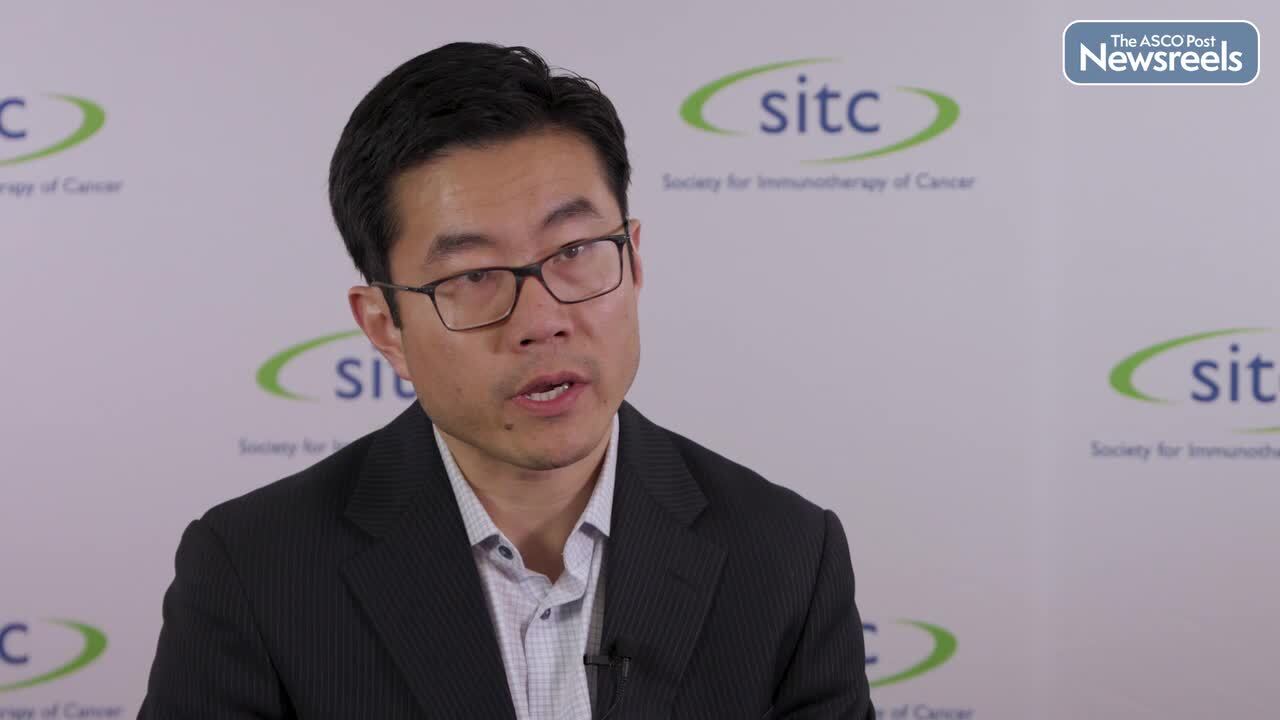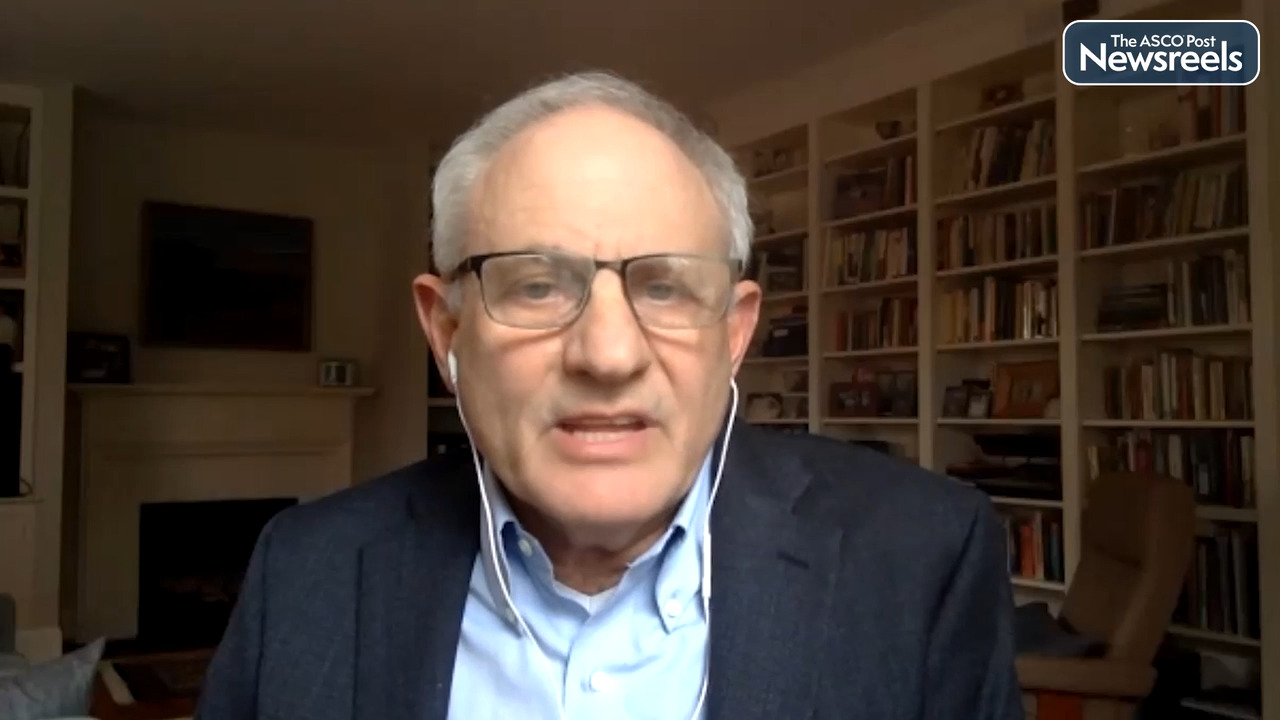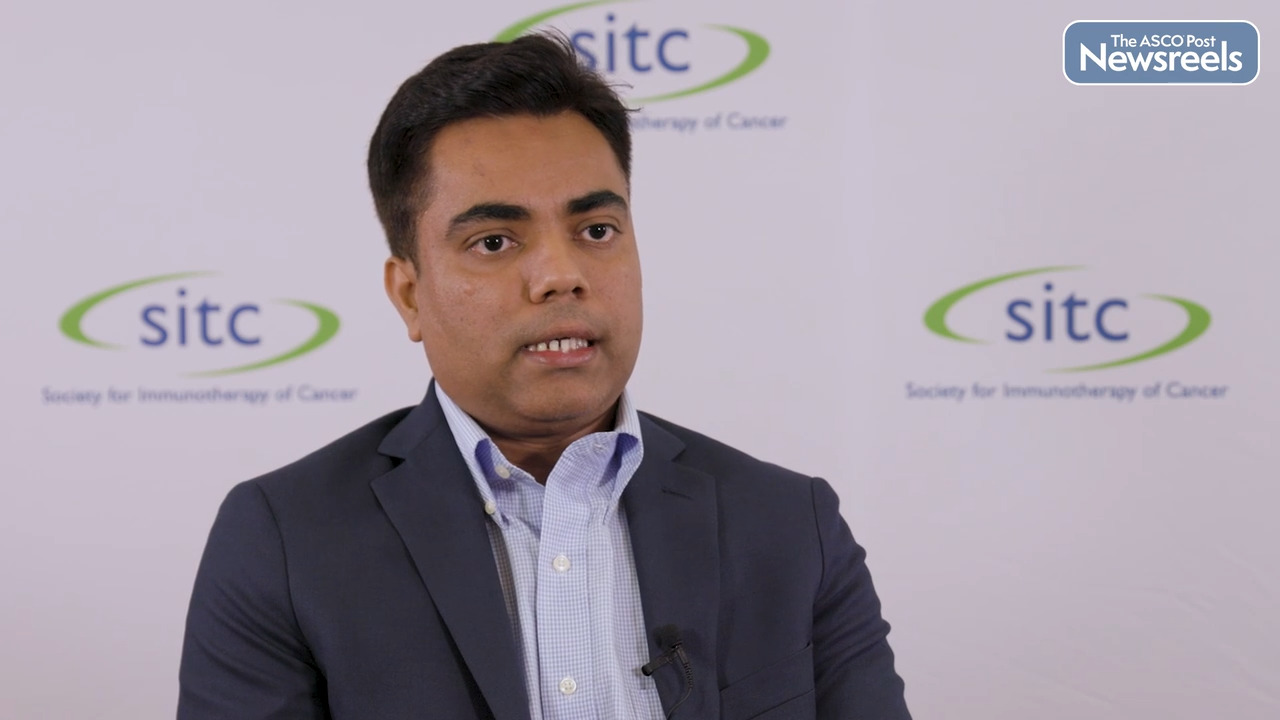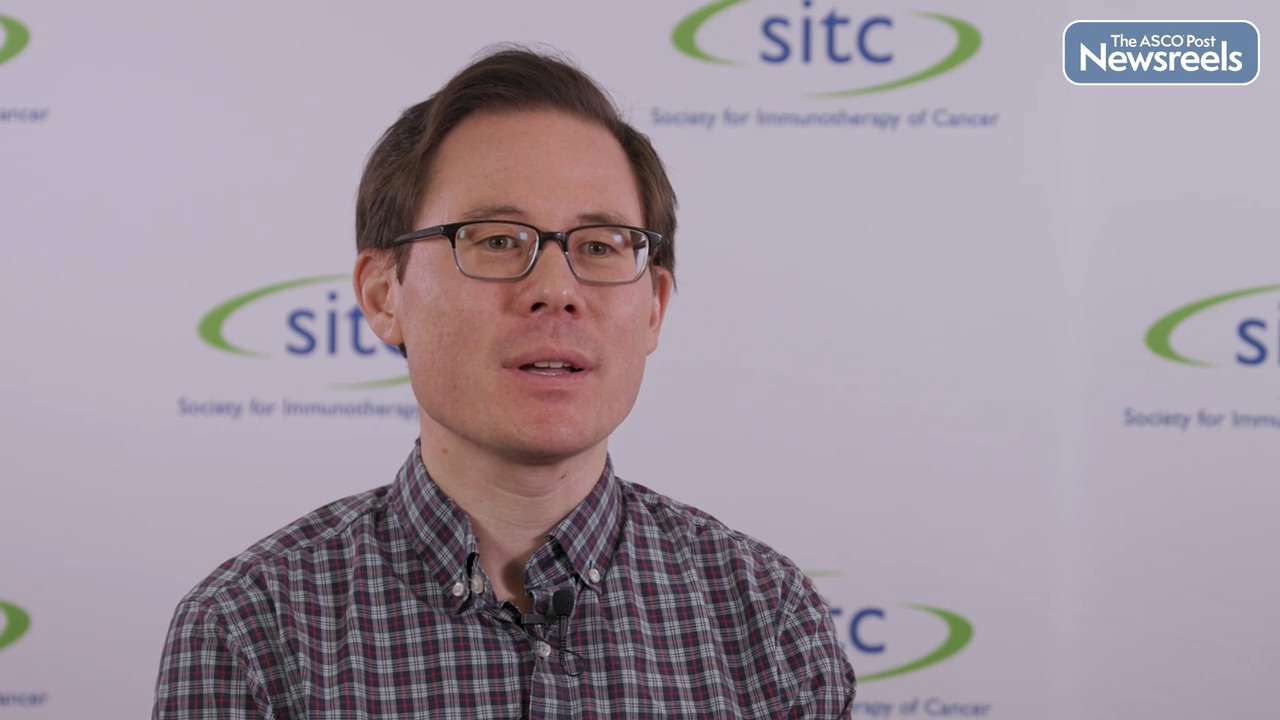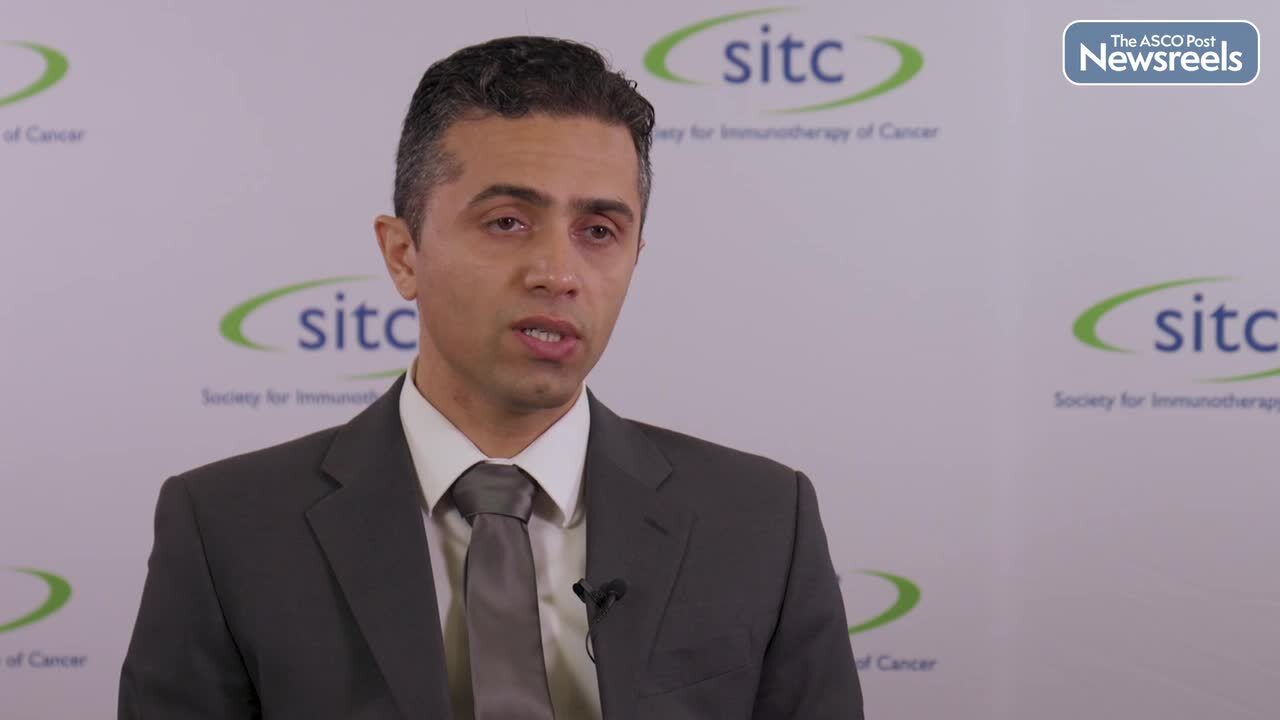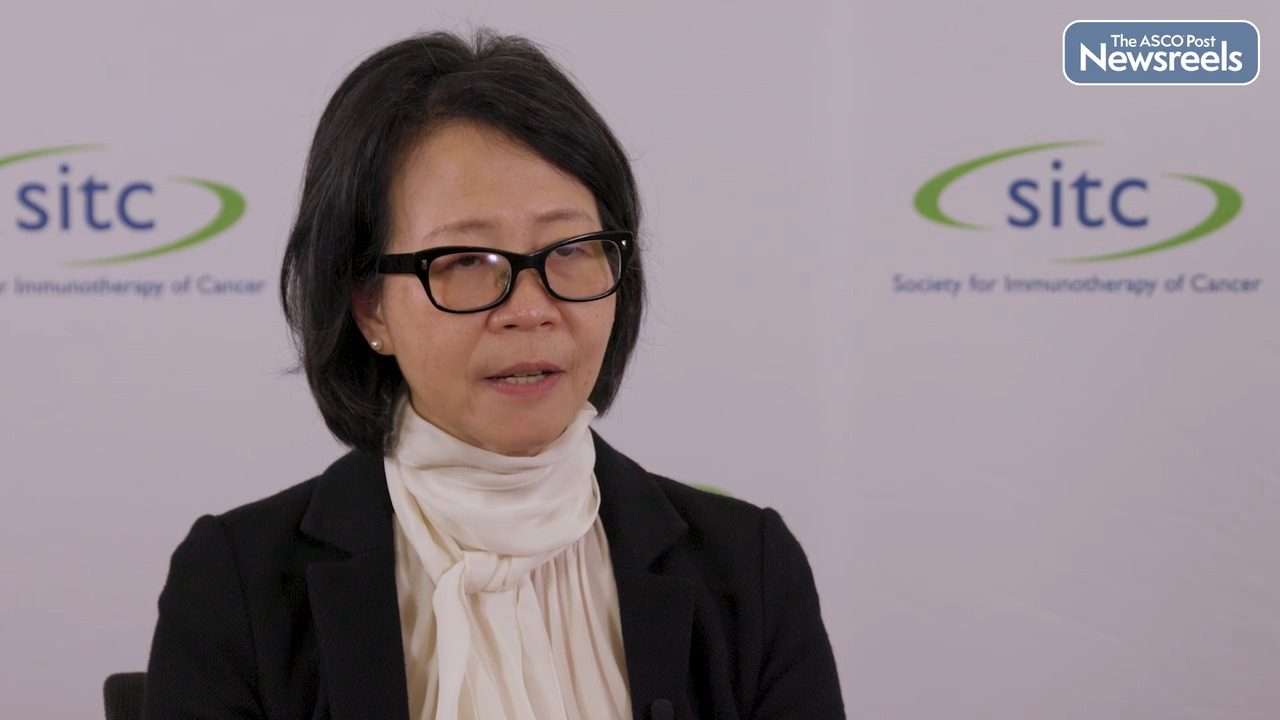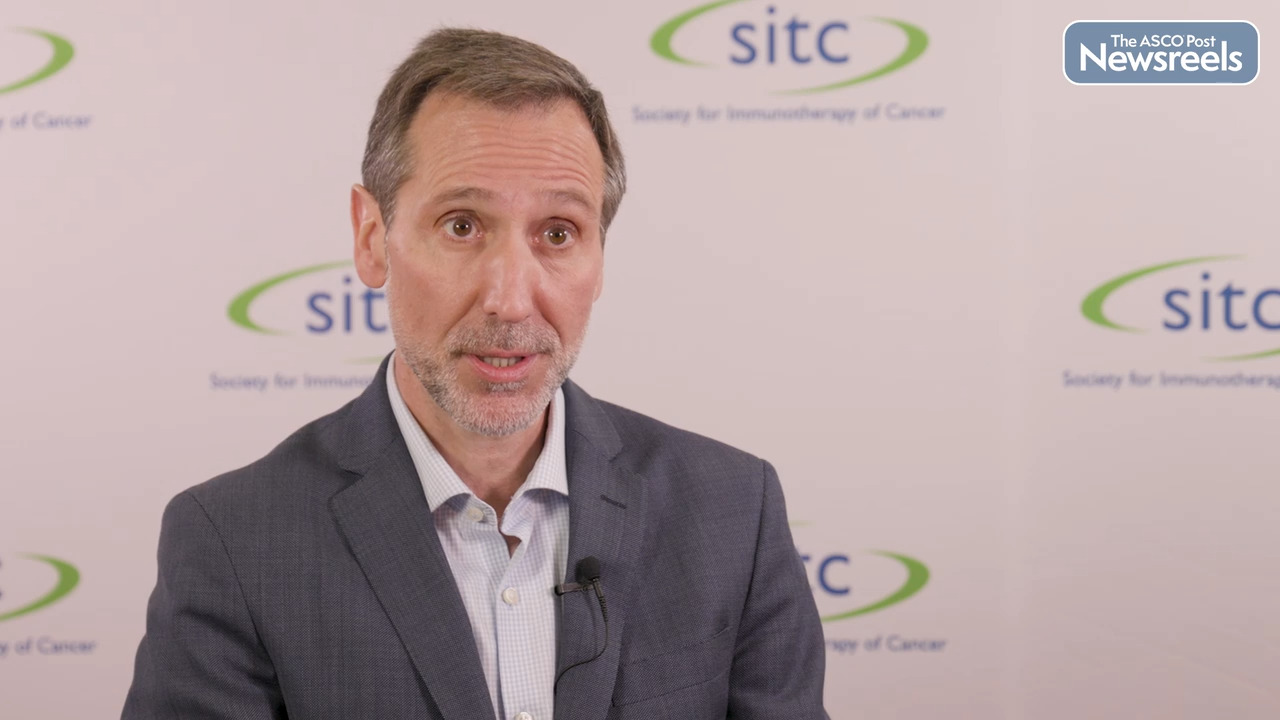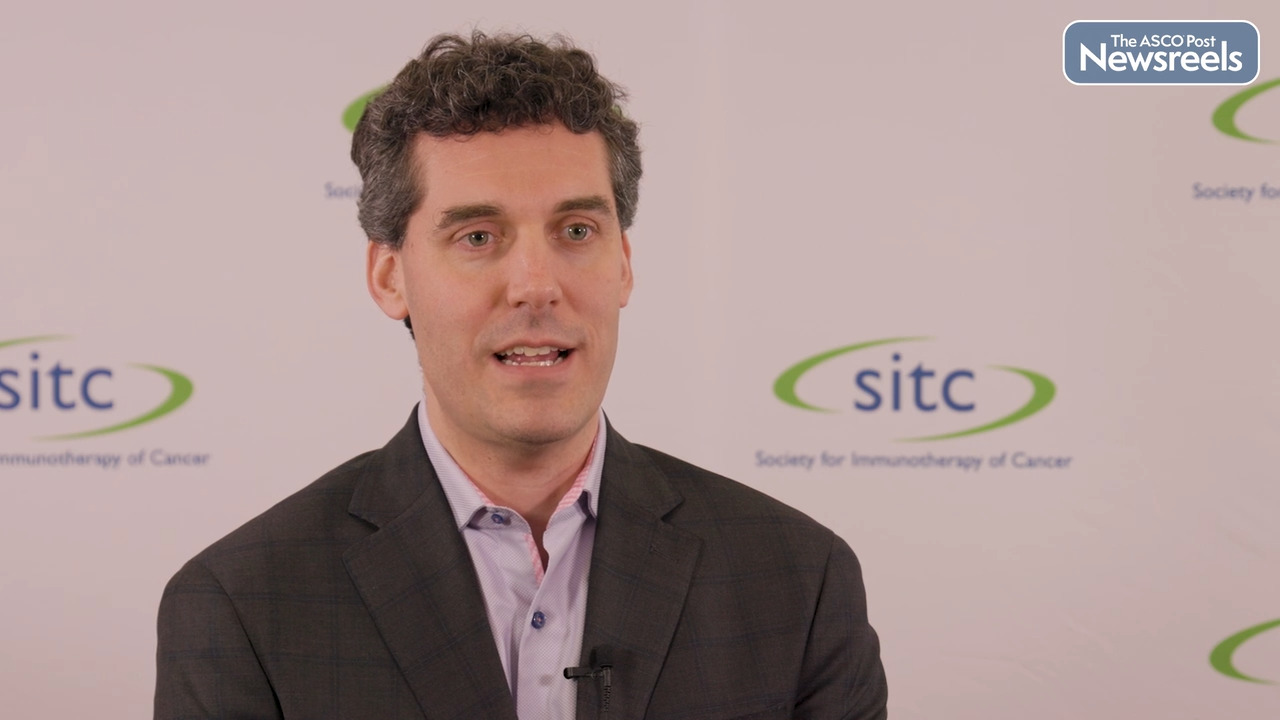Violaine Randrian, MD, PhD, on Lynch Syndrome, Genetics, and Immunotherapy
Violaine Randrian, MD, PhD, of Memorial Sloan Kettering Cancer Center and CHU/Université de Poitiers, reviews gene-specific outcomes in patients with Lynch syndrome treated with immune checkpoint inhibitors for advanced cancer (Abstract 10504).
Heather McArthur, MD, MPH, on Immunotherapy for High-Risk, Early-Stage Breast Cancer
Heather McArthur, MD, MPH, talks about immunotherapy for high-risk, early-stage breast cancer. Dr. McArthur is Associate Professor in the Department of Internal Medicine and Clinical Director of the Breast Cancer Program at Simmons Cancer Center at UT Southwestern Medical Center, Houston. She presented her talk at the Annual International Congress on the Future of Breast Cancer West.
Allison M. Winter, MD, on Richter Transformation: New Data on a CAR T-Cell Treatment
Allison M. Winter, MD, of the Cleveland Clinic Taussig Cancer Institute, discusses real-world outcomes with lisocabtagene maraleucel in patients with Richter transformation, a difficult-to-treat population with a poor prognosis. Data from the Center for International Blood and Marrow Transplant Research showed this therapy provided clinical benefit with a high complete response rate (Abstract 7010).
Sophia McKinley, MD, EdM, on Cutaneous Melanoma: Outcomes With Adjuvant Immunotherapy
Sophia McKinley, MD, EdM, of Massachusetts General Hospital, discusses patterns of recurrence in patients with resected cutaneous melanoma during or after adjuvant immunotherapy. She identifies the risk factors associated with overall survival and treatment failure (Abstract 60).
Jenny H. Chang, MD, on New Findings on Merkel Cell Carcinoma and Neoadjuvant Immunotherapy
Jenny H. Chang, MD, of the Cleveland Clinic, discusses the current surgical and radiologic treatment paradigm for patients with stage III Merkel cell carcinoma and the potential for neoadjuvant immunotherapy to help manage the disease and regional lymph node metastases (Abstract 67).
Saby George, MD, on Clear Cell Kidney Cancer: Subcutaneous vs Intravenous Nivolumab
Saby George, MD, of Roswell Park Comprehensive Cancer Center, discusses pharmacokinetics, efficacy, and safety results from CheckMate 67T, a phase III trial comparing the use of subcutaneous vs intravenous nivolumab in patients with advanced or metastatic clear cell renal cell carcinoma who have received prior systemic therapy (Abstract LBA360).
Syed Muneeb Alam, MD, on Urothelial Carcinoma: Microsatellite Instability and Response to Immune Checkpoint Blockade
Syed Muneeb Alam, MD, of Memorial Sloan Kettering Cancer Center, discusses study findings evaluating links among microsatellite instability status, tumor mutational burden, and response to immune checkpoint blockade in patients with microsatellite instability–high urothelial carcinoma (Abstract 536).
Yasunobu Ishizuka, MD, on Gastric Cancer: Does Nivolumab Infusion Time of Day Matter?
Yasunobu Ishizuka, MD, of Japan’s Aichi Cancer Center, discusses study results showing that scheduling infusions of nivolumab monotherapy before mid-afternoon for patients with metastatic gastric cancer may alter treatment efficacy. Several studies have suggested that circadian rhythm is essential in immune system function, including anticancer immunity (Abstract 268).
Adam S. Kittai, MD, on Richter’s Transformation: Anti-CD19 CAR T-Cell Therapy
Adam S. Kittai, MD, of The Ohio State University, discusses his data supporting the use of CAR T-cell therapy for patients with Richter’s transformation. Given the high response rate to CD19 CAR T-cell treatment, along with early relapse in most patients, allogeneic stem cell transplantation at response should also be considered, he says (Abstract 108).
Peter Schmid, MD, PhD, on Triple-Negative Breast Cancer: Updated Results on Pembrolizumab Plus Chemotherapy
Peter Schmid, MD, PhD, of Queen Mary University of London, discusses phase III findings from the KEYNOTE-522 study, which showed neoadjuvant pembrolizumab plus chemotherapy followed by adjuvant pembrolizumab continues to improve event-free survival compared with neoadjuvant chemotherapy alone in patients with early-stage triple-negative breast cancer, regardless of pathologic complete response (Abstract LBA18).
Mark M. Awad, MD, PhD, on NSCLC: Neoadjuvant Nivolumab Plus Ipilimumab vs Chemotherapy
Mark M. Awad, MD, PhD, of Dana-Farber Cancer Institute, discusses phase III findings from the CheckMate 816 trial, which showed a potential clinical benefit to neoadjuvant nivolumab plus ipilimumab vs chemotherapy in patients with resectable non–small cell lung cancer (NSCLC) (Abstract 1261O).
Ze-rui Zhao, PhD, on Resectable NSCLC: SBRT With Sequential Immunochemotherapy
Ze-rui Zhao, PhD, of China’s Sun Yat-sen University Cancer Center, discusses new phase II findings on stereotactic body radiation therapy (SBRT) with sequential immunochemotherapy as a neoadjuvant treatment of patients with resectable non–small cell lung cancer (NSCLC). This therapy yielded a high major pathologic response rate, according to Dr. Zhao (Abstract LBA60).
Jonathan D. Spicer, MD, PhD, on Early-Stage NSCLC: Survival Results With Pembrolizumab
Jonathan D. Spicer, MD, PhD, of McGill University, discusses findings from the KEYNOTE-671 study of perioperative pembrolizumab for patients with resectable early-stage non–small cell lung cancer (NSCLC). Neoadjuvant pembrolizumab plus chemotherapy followed by resection and adjuvant pembrolizumab improved overall survival compared with neoadjuvant chemotherapy and resection alone in stage II, IIIA, or IIIB (N2) disease (Abstract LBA56).
Shirish M. Gadgeel, MD, on Pembrolizumab Plus Chemotherapy for Metastatic NSCLC: 5-Year Follow-up
Shirish M. Gadgeel, MD, of the Henry Ford Cancer Institute, discusses a 5-year follow-up study of patients with metastatic non–small cell lung cancer (NSCLC) who were treated with pembrolizumab plus chemotherapy. According to Dr. Gadgeel, the findings continue to support the use of pembrolizumab plus chemotherapy as a standard-of-care first-line treatment, including in tumors with a PD-L1 tumor proportion scores of less than 1%.
Matthew J. Frank, MD, PhD, on Large B-Cell Lymphoma: New Data on CD22 CAR T-Cell Therapy
Matthew J. Frank, MD, PhD, of Stanford University School of Medicine, discusses new findings showing that CD22 chimeric antigen receptor (CAR) T-cell therapy is an effective and safe salvage therapy for patients with CAR19-refractory large B-cell lymphoma. A multicenter phase II clinical trial is planned for 2023 (Abstract S230).
Shailender Bhatia, MD, on Merkel Cell Carcinoma: Results From CheckMate 358 on Nivolumab With or Without Ipilimumab
Shailender Bhatia, MD, of the University of Washington and Fred Hutchinson Cancer Center, discusses phase I/II results on the efficacy of nivolumab with or without ipilimumab in patients with recurrent or metastatic Merkel cell carcinoma. The study found that, for this rare and aggressive skin cancer, nivolumab showed clinical activity in advanced disease. However, these results from CheckMate 358 do not suggest an additional benefit with ipilimumab added to nivolumab (Abstract 9506).
Jason J. Luke, MD, on Melanoma Adjuvant Therapy: Final Analysis of KEYNOTE-716
Jason J. Luke, MD, of the University of Pittsburgh Medical Center Hillman Cancer Center, discusses adjuvant pembrolizumab, which, in previous results, improved distant metastasis– and recurrence-free survival in patients with resected stage IIB or IIC melanoma vs placebo. After a median follow-up of 39.4 months, adjuvant pembrolizumab continued to show a benefit over placebo, with no new safety signals (Abstract LBA9505).
Jonathan W. Riess, MD, on EGFR-Mutated Non–Small Cell Lung Cancer: What’s Next?
Jonathan W. Riess, MD, of the University of California, Davis Comprehensive Cancer Center, explores the findings of three important clinical trials in lung cancer treatment: whether to incorporate immune checkpoint inhibitors into the treatment of EGFR-mutated lung cancer, the importance of central nervous system activity in EGFR-mutant lung cancer, and new therapies for disease with EGFR exon 20 insertion.
Narjust Florez, MD, and Heather A. Wakelee, MD, on Early-Stage NSCLC: Phase III Findings From KEYNOTE-671 on Pembrolizumab and Platinum-Based Chemotherapy
Narjust Florez, MD, of Dana-Farber Cancer Institute, and Heather A. Wakelee, MD, of Stanford University, Stanford Cancer Institute, discuss new data supporting neoadjuvant pembrolizumab plus chemotherapy followed by surgery and adjuvant pembrolizumab as a promising new treatment option for patients with resectable stage II, IIIA, or IIIB (N2) non–small cell lung cancer (NSCLC) (Abstract LBA100).
Allison Betof Warner, MD, PhD, and Adnan Khattak, PhD, MBBS, on High-Risk Resected Melanoma: Survival Results With mRNA-4157 and Pembrolizumab in KEYNOTE-942
Allison Betof Warner, MD, PhD, of Stanford University Medical Center, and Adnan Khattak, MBBS, FRACP, PhD, of Australia’s Hollywood Private Hospital & Edith Cowan University, discuss the use of the mRNA-4157 vaccine in combination with pembrolizumab as adjuvant therapy for resected high-risk melanoma, which prolonged distant metastasis–free survival compared with pembrolizumab alone. These results provide further evidence that a personalized neoantigen approach is potentially beneficial (Abstract LBA9503).
Rana R. McKay, MD, and Brian I. Rini, MD, on Clear Cell RCC: New Data From KEYNOTE-426 on Pembrolizumab Plus Axitinib vs Sunitinib
Rana R. McKay, MD, of the University of California, San Diego, and Brian I. Rini, MD, of Vanderbilt-Ingram Cancer Center, discuss the 5-year follow-up results with the combination of a checkpoint inhibitor plus a VEGFR tyrosine kinase inhibitor as first-line treatment for patients with advanced clear cell renal cell carcinoma (RCC). Pembrolizumab plus axitinib continued to demonstrate improved survival outcomes as well as overall response rate vs sunitinib for patients with previously untreated disease (Abstract LBA4501).
Bobbie J. Rimel, MD, Isabelle L. Ray-Coquard, MD, PhD, on Cervical Squamous Carcinoma: Neoadjuvant Nivolumab Plus Ipilimumab
Bobbie J. Rimel, MD, of Cedars-Sinai Medical Center, and Isabelle L. Ray-Coquard, MD, PhD, of Centre Léon Bérard and the University Claude Bernard Lyon Est, discuss findings from the COLIBRI trial, which showed that, for patients with cervical squamous cell carcinoma, neoadjuvant nivolumab plus ipilimumab is safe and orchestrates de novo immune responses. The 82.5% complete response rate for primary tumors 6 months after standard chemoradiation therapy suggests favorable clinical outcomes (Abstract 5501).
Georgina V. Long, MD, PhD, on Resected Melanoma: Biomarkers for and Efficacy of Adjuvant Nivolumab vs Placebo
Georgina V. Long, MD, PhD, of Melanoma Institute Australia and The University of Sydney, discusses new data showing that patients with resected stage IIB/C melanoma who were treated with adjuvant nivolumab had prolonged recurrence-free survival compared with placebo across all biomarker subgroups. The baseline biomarkers most predictive of prolonged recurrence-free survival with nivolumab were high interferon gamma score, high tumor mutational burden, CD8 T-cell infiltration, and low C-reactive protein (Abstract 9504).
Omid Hamid, MD, on Advanced Melanoma: Durable Response With Fianlimab Plus Cemiplimab
Omid Hamid, MD, of The Angeles Clinic & Research Institute, discusses study findings on fianlimab plus cemiplimab-rwlc, which showed clinical activity in patients with advanced melanoma, comparing favorably with other approved combinations of immune checkpoint inhibitors in the same clinical setting. This is the first indication that dual LAG-3 blockade may produce a high level of activity with significant overall response rate after adjuvant anti–PD-1 treatment. A phase III trial of this regimen in treatment-naive patients with advanced melanoma is ongoing (Abstract 9501).
Tycel J. Phillips, MD, and Swetha Kambhampati, MD, on Mantle Cell Lymphoma: Real-World Outcomes With Brexucabtagene Autoleucel
Tycel J. Phillips, MD, and Swetha Kambhampati, MD, both of City of Hope National Medical Center, discuss new findings showing that the real-world effectiveness and safety of brexucabtagene autoleucel were similar to data from the pivotal ZUMA-2 trial in patients with relapsed or refractory mantle cell lymphoma, regardless of prior BTK inhibition, bendamustine, or autologous stem cell transplantation (Abstract 7507).
Bradley J. Monk, MD, on Cervical Cancer: Findings on Pembrolizumab Plus Chemotherapy
Bradley J. Monk, MD, of the University of Arizona, Phoenix, and Creighton University, discusses phase III findings from the KEYNOTE-826 study of overall survival results in patients with persistent, recurrent, or metastatic cervical cancer. Study participants received first-line treatment of pembrolizumab plus chemotherapy, with or without bevacizumab, which reduced the risk of death by up to 40% in three different subsets of patients (Abstract 5500).
Shilpa Gupta, MD, on Urothelial Carcinoma: Long-Term Outcome of Enfortumab Vedotin Plus Pembrolizumab
Shilpa Gupta, MD, of Cleveland Clinic, discusses the results from the EV-103 study and the unmet need for effective first-line therapies in cisplatin-ineligible patients with locally advanced or metastatic urothelial carcinoma. After nearly 4 years of follow-up, the trial findings showed that enfortumab vedotin-ejfv plus pembrolizumab continues to demonstrate promising survival trends with rapid and durable responses in this population (Abstract 4505).
Dario A. Vignali, PhD, on LAG3: The Third Checkpoint Inhibitor
Dario A. Vignali, PhD, of the University of Pittsburgh School of Medicine, discusses LAG3, the third inhibitory receptor to be used in the clinic. He describes the signaling mechanism this immunotherapy uses; new insight into its function, alone and in combination with PD-1; and an analysis of samples from patients treated with LAG3/PD-1 therapeutics. (Abstract PL04-05)
Jordan McPherson, PharmD, MS, BCOP, on Managing Immunotherapy-Related Toxicities
Jordan McPherson, PharmD, MS, BCOP, of the Huntsman Cancer Institute at the University of Utah, summarizes a case-based panel discussion on best practices in caring for patients with immune-related adverse events. He focuses on pneumonitis, which can occur with immune checkpoint inhibitor therapy, detailing factors such as comorbidities, infectious etiology, and disease progression; the need to consider myositis and myasthenia gravis in patients who develop immune-related myocarditis; and oral toxicities including mucositis and sicca syndrome.
Michael K. Gibson, MD, PhD, on Metastatic Esophageal Squamous Cell Carcinoma: New First-Line Systemic Treatment Options
Michael K. Gibson, MD, PhD, of Vanderbilt-Ingram Cancer Center, discusses the importance of developing additional treatment strategies for patients with advanced or metastatic esophageal squamous cell carcinoma and describes the role of immune checkpoint inhibitors. Dr. Gibson also reviews the available evidence on the use of nivolumab in this patient population.
Filippo Pietrantonio, MD, on Gastric or Gastroesophageal Junction Adenocarcinoma: Recent Data on Treatment With Tremelimumab and Durvalumab
Filippo Pietrantonio, MD, of Italy’s Istituto Nazionale dei Tumori, discusses phase II results from the INFINITY trial of tremelimumab and durvalumab as neoadjuvant treatment of patients with microsatellite instability–high (MSI) resectable gastric or gastroesophageal junction adenocarcinoma (GAC/GEJAC). These results open the way to investigate nonoperative management in patients with clinical, pathologic, and molecular complete response after T300/D (300 mg of tremelimumab and 1,500 mg every 4 weeks of durvalumab) (Abstract 358).
Manik A. Amin, MD, on Novel Immune Therapies in GI Cancers: What’s on the Horizon?
Manik A. Amin, MD, of Dartmouth Cancer Center, discusses the future of immunotherapy in gastrointestinal cancers, the challenges of creating effective adoptive cell therapies, and the next generation of immune checkpoint inhibitors.
Richard S. Finn, MD, on HCC: Tislelizumab vs Sorafenib, and Their Impact on Quality of Life
Richard S. Finn, MD, of the David Geffen School of Medicine at the University of California, Los Angeles, discusses findings from the RATIONALE-301 study, which showed that patients with unresectable hepatocellular carcinoma (HCC) treated with first-line tislelizumab had better health-related quality-of-life outcomes compared with those treated with sorafenib, particularly in terms of fatigue and physical functioning. These results, along with the effects on overall survival, response rate, and a favorable safety profile, support the benefit of tislelizumab as a potential first-line treatment option in this patient population (Abstract 495).
Jiye Liu, PhD, on Multiple Myeloma: Genome-Wide CRISPR-Cas9 Screening Identifies KDM6A as a Modulator of Daratumumab Sensitivity
Jiye Liu, PhD, of Dana-Farber Cancer Institute, discusses study findings that demonstrate KDM6A regulates CD38 and CD48 expression in multiple myeloma. Dr. Liu’s team validated combination treatment with an FDA-approved EZH2 inhibitor plus daratumumab, which can overcome daratumumab resistance in preclinical multiple myeloma models, providing the rationale for combination clinical trials to improve patient outcome (Abstract 148).
Francesco Maura, MD, on Genomic Determinants of Resistance in Newly Diagnosed Multiple Myeloma Treated With Targeted Immunotherapy
Francesco Maura, MD, of the University of Miami, Sylvester Comprehensive Cancer Center, discusses his team’s findings in which they defined a comprehensive catalogue of genomic determinants of response to DKRd (carfilzomib, lenalidomide, dexamethasone) in newly diagnosed multiple myeloma. The researchers have identified a number of new genomic alterations that explain resistance to the agents currently used in combination regimens (Abstract 470).
Eileen M. Boyle, MD, PhD, on Multiple Myeloma: Sustained MRD Negativity in Newly Diagnosed Disease Treated with Immunotherapy Regimens
Eileen M. Boyle, MD, PhD, of the Perlmutter Cancer Center, NYU Langone Health, discusses Fc-mediated antibody effector function, inflammation resolution, and oligoclonality and their role in predicting sustained measurable residual disease negativity in patients with newly diagnosed multiple myeloma who were treated with immunotherapy regimens. For the first time, an analysis of T-cell receptors shows that oligoclonal profiles seen on treatment may influence the fitness of the immune response (Abstract 100).
Joseph Schroers-Martin, MD, on Posttransplant Lymphoproliferative Disorders: Tumor Microenvironment Determinants of Immunotherapy Response
Joseph Schroers-Martin, MD, of Stanford University, discusses immunogenomic features reflecting divergent biology in posttransplant lymphoproliferative disorders (PTLD). These include evidence of mismatch repair defects in Epstein-Barr virus–positive PTLD, tumor microenvironment depletion, and MYC pathway enrichment in certain patients (Abstract 72).
Eunice S. Wang, MD, on AML: Gemtuzumab Ozogamicin Plus Standard Induction Chemotherapy Improves Outcomes
Eunice S. Wang, MD, of Roswell Park Comprehensive Cancer Center, discusses the outcomes of patients newly diagnosed with acute myeloid leukemia (AML) who were treated with cytarabine plus daunorubicin plus gemtuzumab ozogamicin (GO). These patients experienced higher rates of measurable residual disease–negative complete remission and complete remission with incomplete count recovery, compared to those treated with cytarabine plus idarubicin daunorubicin alone. Although adding GO was not associated with improved overall survival, longer follow-up is warranted to determine an absolute survival advantage of this regimen (Abstract 58).
Tycel J. Phillips, MD, on Mantle Cell Lymphoma: New Findings on Glofitamab Monotherapy
Tycel J. Phillips, MD, of the City of Hope National Medical Center, discusses data that showed fixed-duration glofitamab monotherapy induced high and durable complete response rates in patients with mantle cell lymphoma (MCL) who received obinutuzumab pretreatment. This is one of the largest data sets and longest follow-ups reported with a CD20/CD3 bispecific monoclonal antibody for patients with relapsed or refractory MCL (Abstract 74).
Sara A. Hurvitz, MD: New Findings on Neoadjuvant Trastuzumab Deruxtecan and Anastrozole in Early-Stage Breast Cancer
Sara A. Hurvitz, MD, of the University of California, Los Angeles, Jonsson Comprehensive Cancer Center, discusses phase II results from the TRIO-US B-12 TALENT study, which showed that patients with localized, hormone receptor–positive, HER2-low breast cancer who are treated with fam-trastuzumab deruxtecan-nxki (T-DXd) in the neoadjuvant setting had an overall response rate (ORR) of 68%. When combined with anastrozole, T-DXd led to a 58% ORR. This is the first trial to evaluate T-DXd in HER2-low breast cancer, a potentially curable disease (Abstract GS2-03).
Sara A. Hurvitz, MD, on Updated Survival Results on T-DXd vs T-DM1 in Metastatic Breast Cancer
Sara A. Hurvitz, MD, of the University of California, Los Angeles, Jonsson Comprehensive Cancer Center, discusses phase III findings from the DESTINY-Breast03 study, which showed that second-line treatment with fam-trastuzumab deruxtecan-nxki (T-DXd) led to longer overall survival compared with ado-trastuzumab emtansine (T-DM1) in patients with HER2-positive metastatic breast cancer. Patients treated with T-DXd had a 36% lower risk of death than those treated with T-DM1 (Abstract GS2-02).
Sumanta Pal, MD, on Renal Cell Carcinoma: CRISPR-Engineered CAR T Cells in Advanced Disease
Sumanta Pal, MD, of the City of Hope Comprehensive Cancer Center, discusses phase I results from the COBALT-RCC study, a first-in-human clinical trial exploring CD70 CAR T-cell therapy in patients with clear cell renal cell carcinoma. The agent appeared to show an excellent safety profile with no unexpected toxicities and antitumor activity. One durable complete response is the first to be achieved with allogeneic CAR T-cell therapy in patients with relapsed or refractory solid tumors, offering proof of concept for further exploration of CD70-targeted CAR T cells in renal cell and other CD70-positive malignancies (Abstract 558).
Roger Li, MD, on Bladder Cancer: Boosting Immune Checkpoint Blockade With an Oncolytic Adenovirus
Roger Li, MD, of the H. Lee Moffitt Cancer Center, discusses results from a phase II single-arm study of CG0070, a cancer-selective oncolytic adenovirus that creates mechanistic synergy with immune checkpoint blockade. In this trial, the virus was combined with pembrolizumab in patients with non–muscle-invasive bladder cancer that is unresponsive to bacillus Calmette-Guérin. At 3 months, 88% of the 35 patients enrolled achieved a complete response (Abstract 666).
Michael B. Atkins, MD, on Reconciling Differences in Phase II and III Immuno-oncology Trial Data
Michael B. Atkins, MD, of Georgetown Lombardi Comprehensive Cancer Center, explores recent clinical trials in immuno-oncology in which the phase III trial produced markedly different results from the phase II trial. To help understand the potential value to patients of late-stage trials of treatment combinations, the Society for Immunotherapy of Cancer has developed a checklist for investigators, applicable to any regimen in which immune modulation is an important component of the antitumor effect.
Kishu Ranjan, PhD, on Non–Small Cell Lung Cancer: New Findings on a Biomarker and Immunotherapy Resistance
Kishu Ranjan, PhD, of Yale University School of Medicine, discusses his study findings, which identified a deficiency in the biomarker TAP2 as a prominent immune evasion mechanism in patients whose non–small cell lung cancer has resisted immunotherapy (Abstract 148).
Jonathan Chen, MD, PhD, on NSCLC: Predicting Response to Immunotherapy
Jonathan Chen, MD, PhD, of Massachusetts General Hospital, discusses “immunity hubs” that interact with a reservoir of stem-like CD8 T cells and appear to be associated with subsequent response to anti–PD-1 blockade in patients with non–small cell lung cancer. Hybrid hubs, Dr. Chen says, are a favorable class of immunity hub notable for CD8-positive and TCF7-positive cells, as well as CCL19 expression (Abstract 956).
Saman Maleki, PhD, on Melanoma: Reducing Primary Resistance to Immunotherapy
Saman Maleki, PhD, of Canada’s Western University and Lawson Health Research Institute, discusses modifying the gut microbiome in patients with advanced melanoma to induce a response to anti–PD-1 therapy and potentially reduce primary resistance to immunotherapy. A fecal microbiota transplant from healthy donors before treatment appears to be beneficial (Abstract 614).
Julia Tchou, MD, PhD, on Triple-Negative Breast Cancer: Radiation Boost Plus Pembrolizumab
Julia Tchou, MD, PhD, of the University of Pennsylvania, discusses preliminary results of the phase Ib/II BreastVax study, which suggested a single preoperative pembrolizumab dose plus a tumor-targeting radiation boost may result in pathologic response in patients with early-stage triple-negative breast cancer (Abstract 644).
Antoni Ribas, MD, PhD, on Solid Tumors: Safety and Efficacy of TCR T-Cell Therapy
Antoni Ribas, MD, PhD, of the University of California, Los Angeles, discusses a phase I study that used CRISPR gene editing to simultaneously “knock out” endogenous T-cell receptors and replace them with personalized neoantigen T-cell receptors in patients with solid tumors. The edited TCR T-cell products were safely infused and trafficked to the tumor lesions (Abstract 1478).
Michael A. Postow, MD, on Using the Novel Radiotracer Crefmirlimab Berdoxam for Imaging to Assess Immunotherapy Responsiveness
Michael A. Postow, MD, of Memorial Sloan Kettering Cancer Center, discusses new findings on the correlation between CD8 cell PET imaging with zirconium-89–crefmirlimab berdoxam and CD8 cell immunohistochemistry in patients with advanced cancer receiving immunotherapy. Noninvasive CD8 PET scanning with crefmirlimab berdoxam permits whole-patient, longitudinal CD8 assessment, which is currently under investigation as a biomarker for immunotherapy responsiveness and may be a useful tool for immunotherapy development and clinical management (Abstract 1472).

